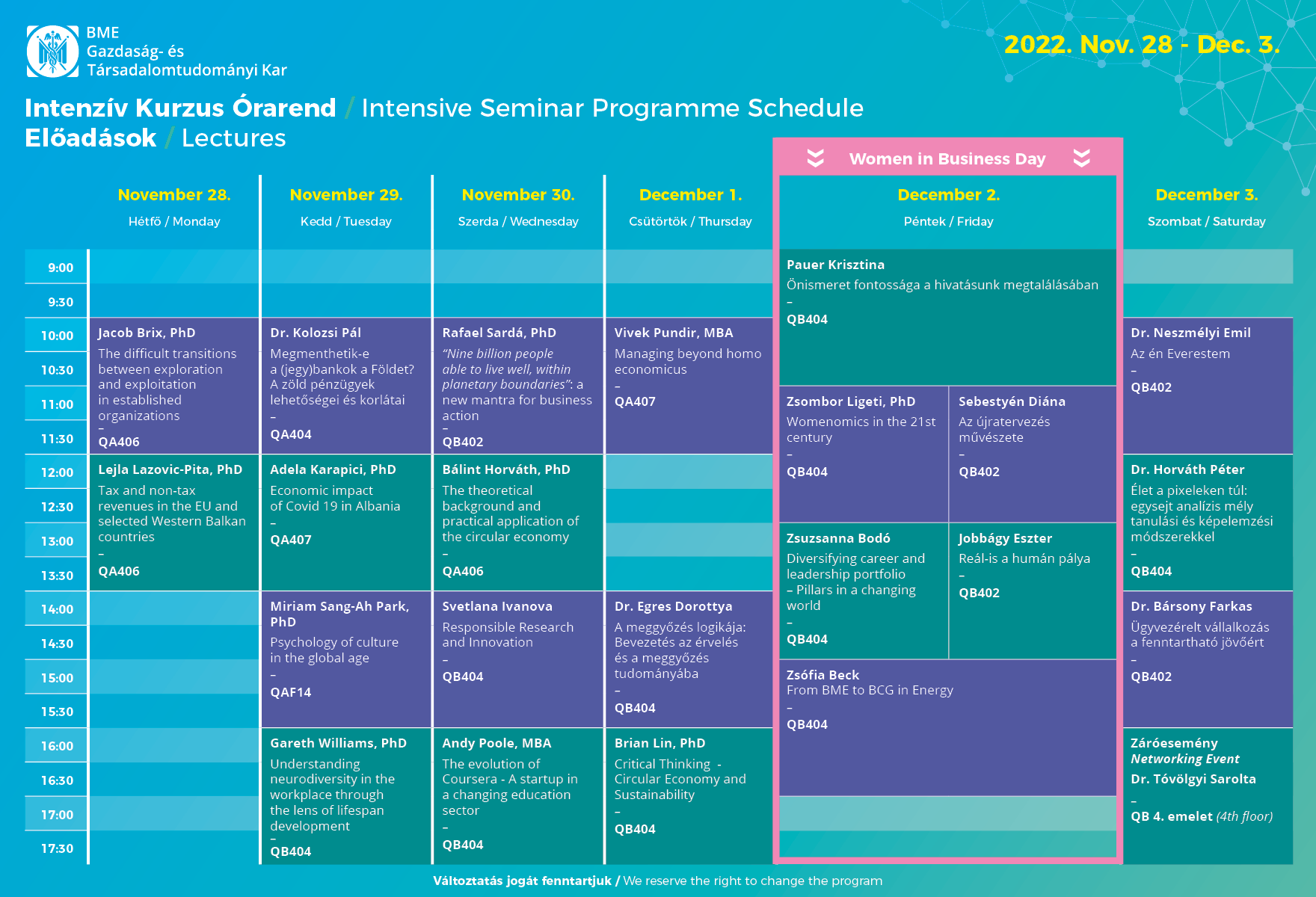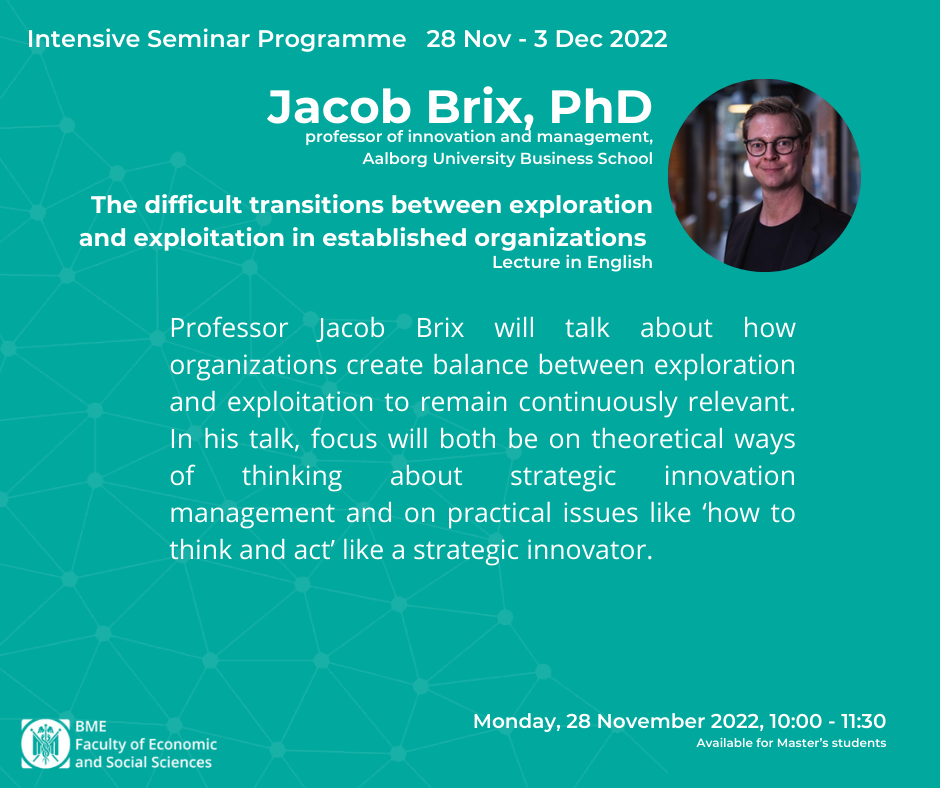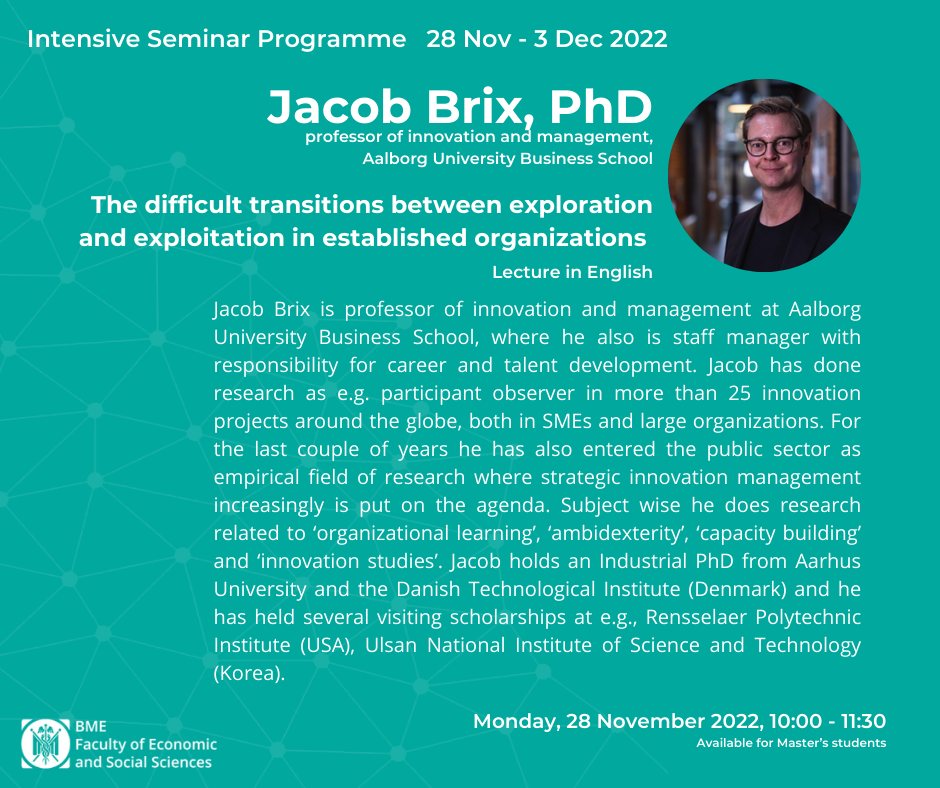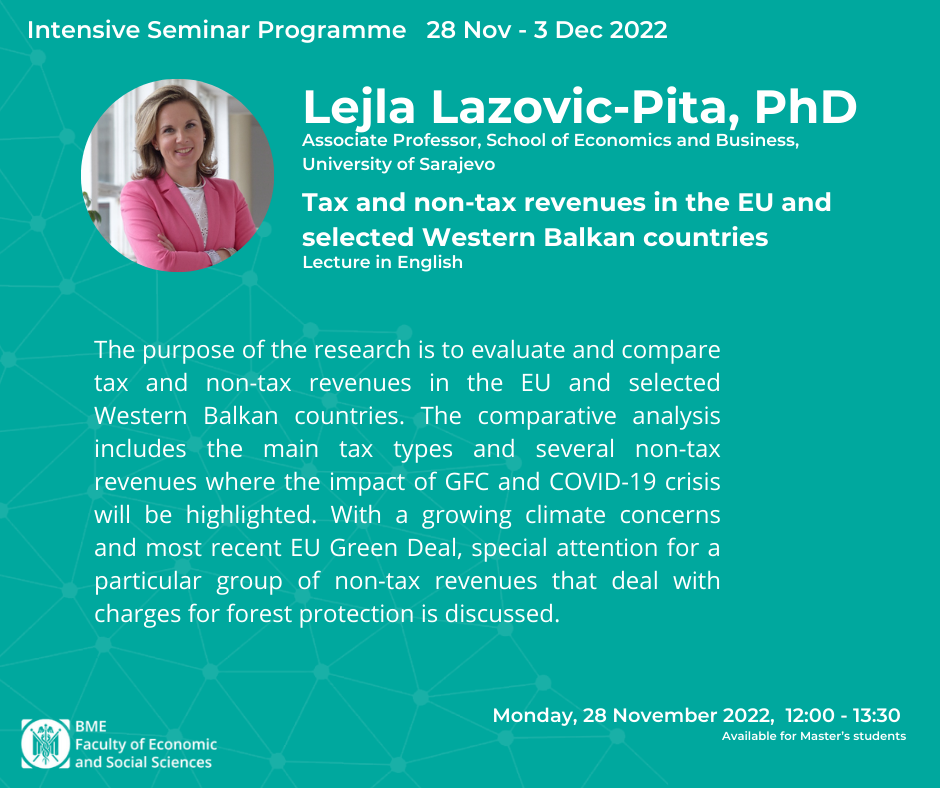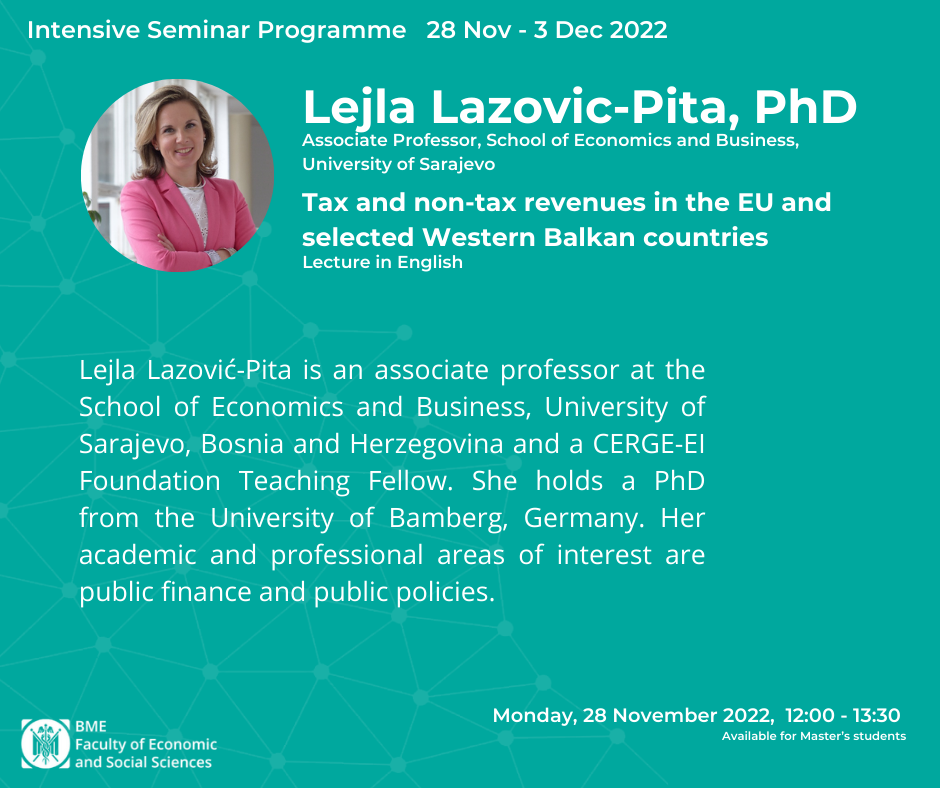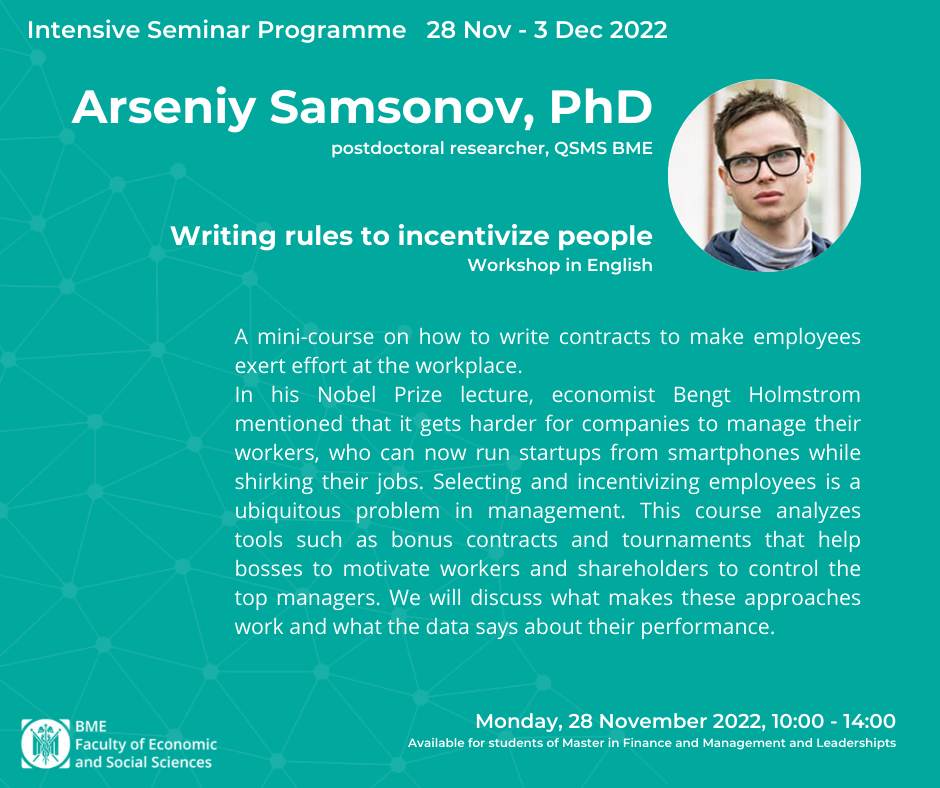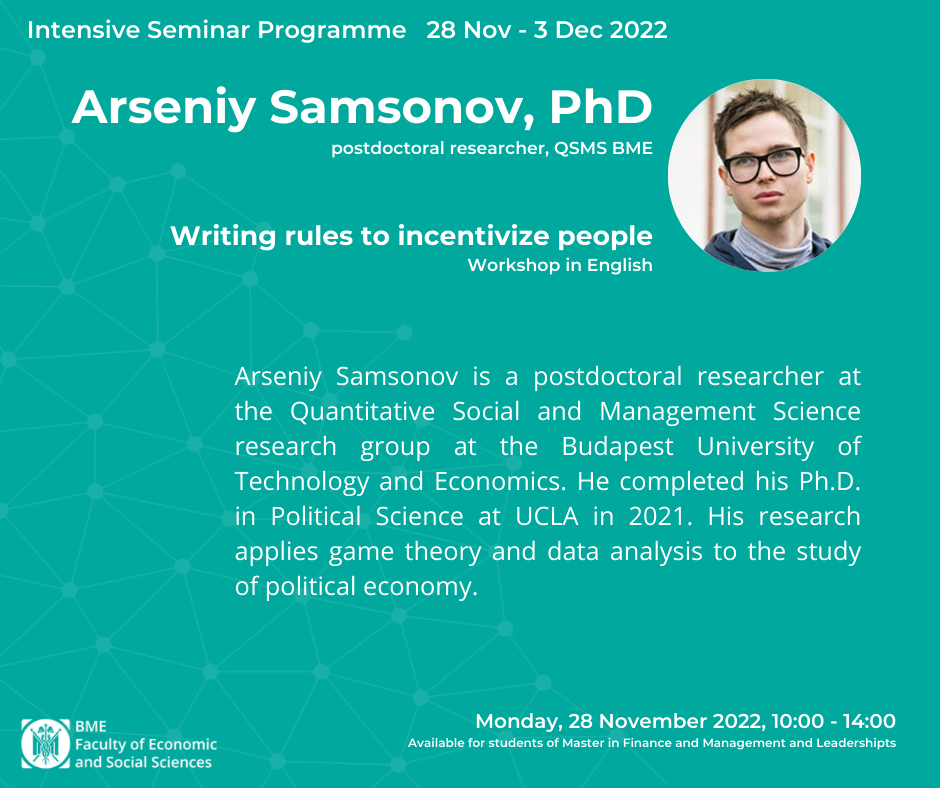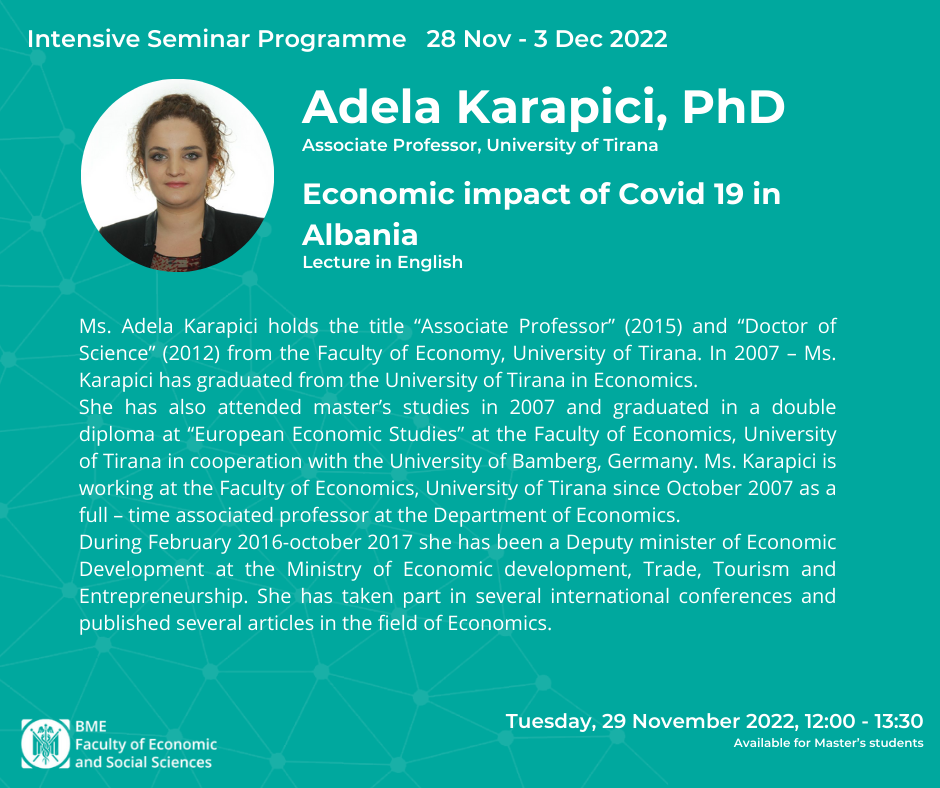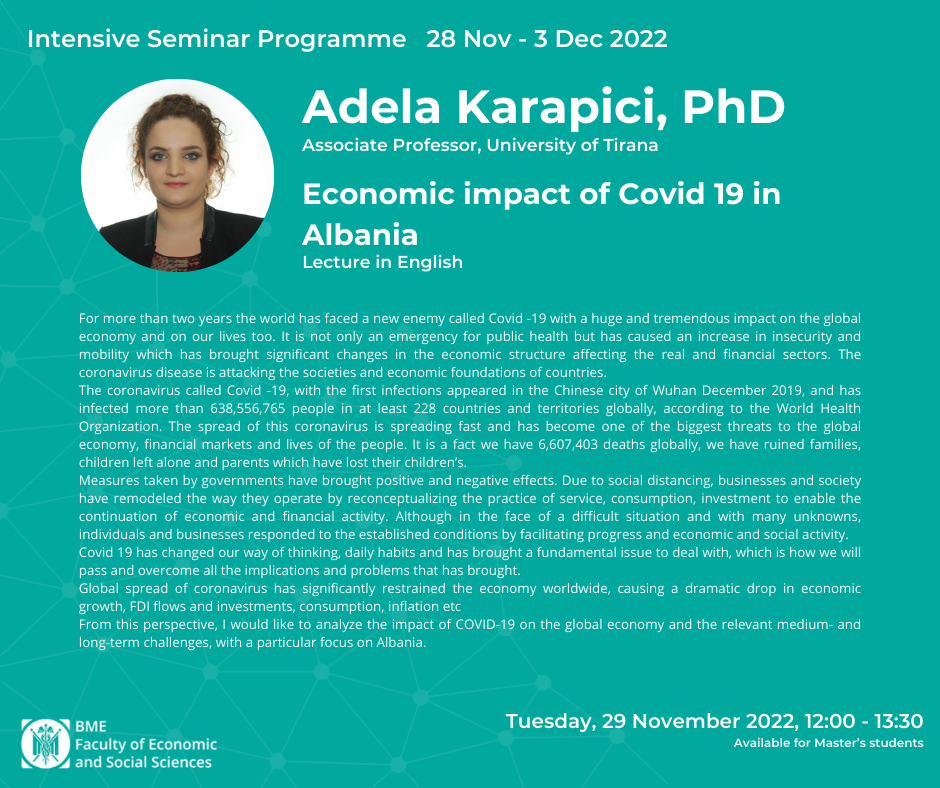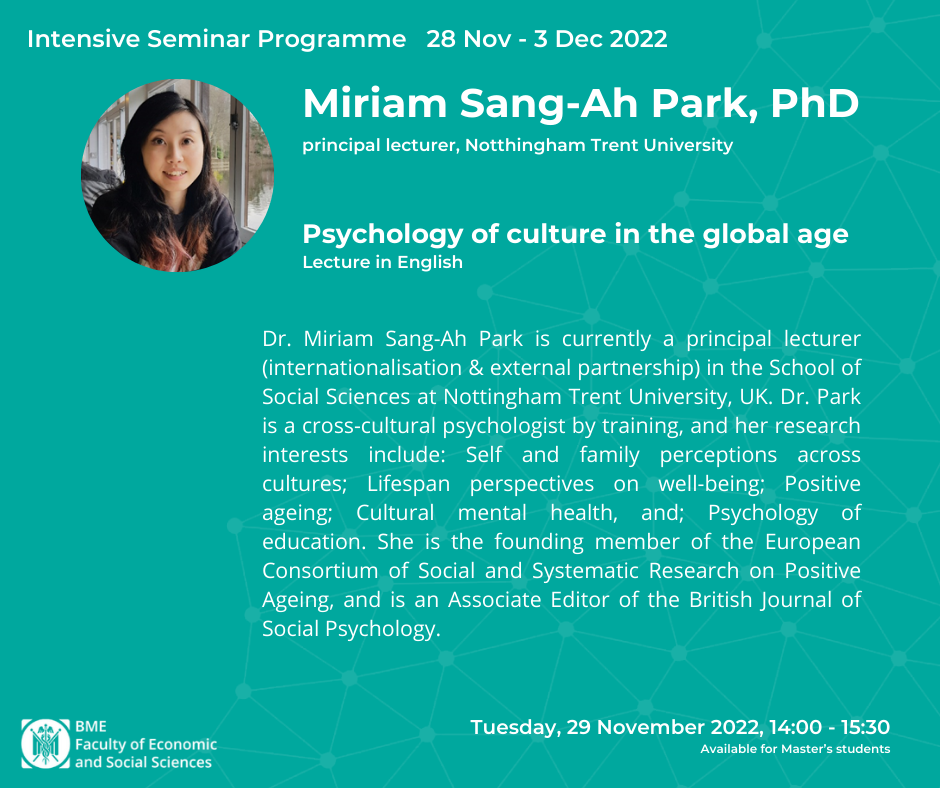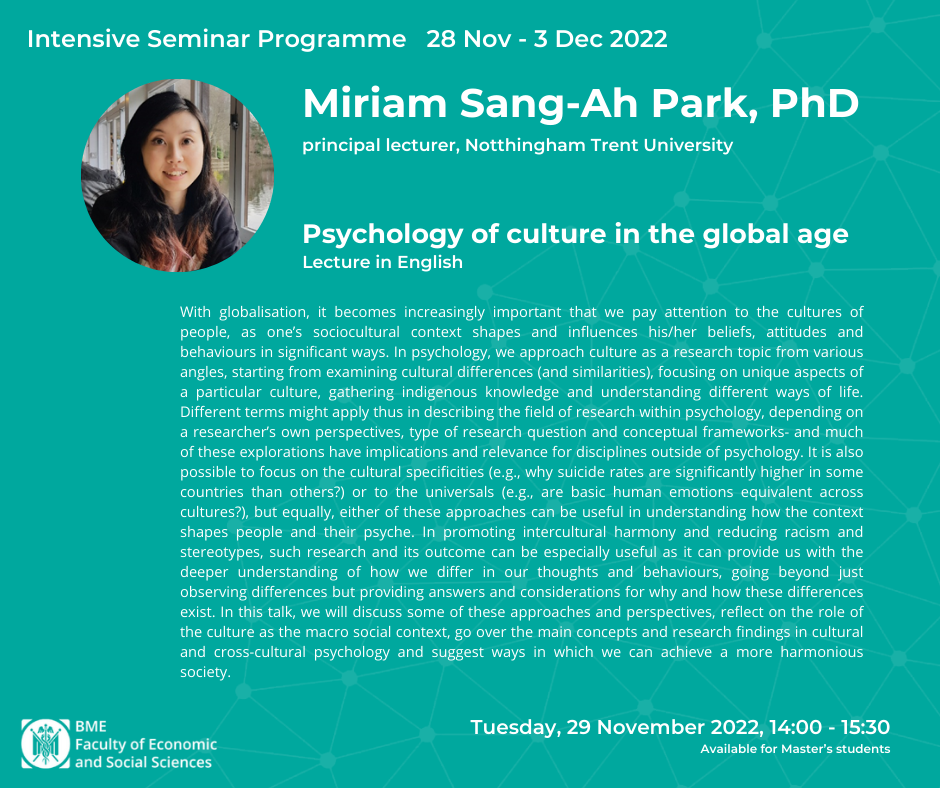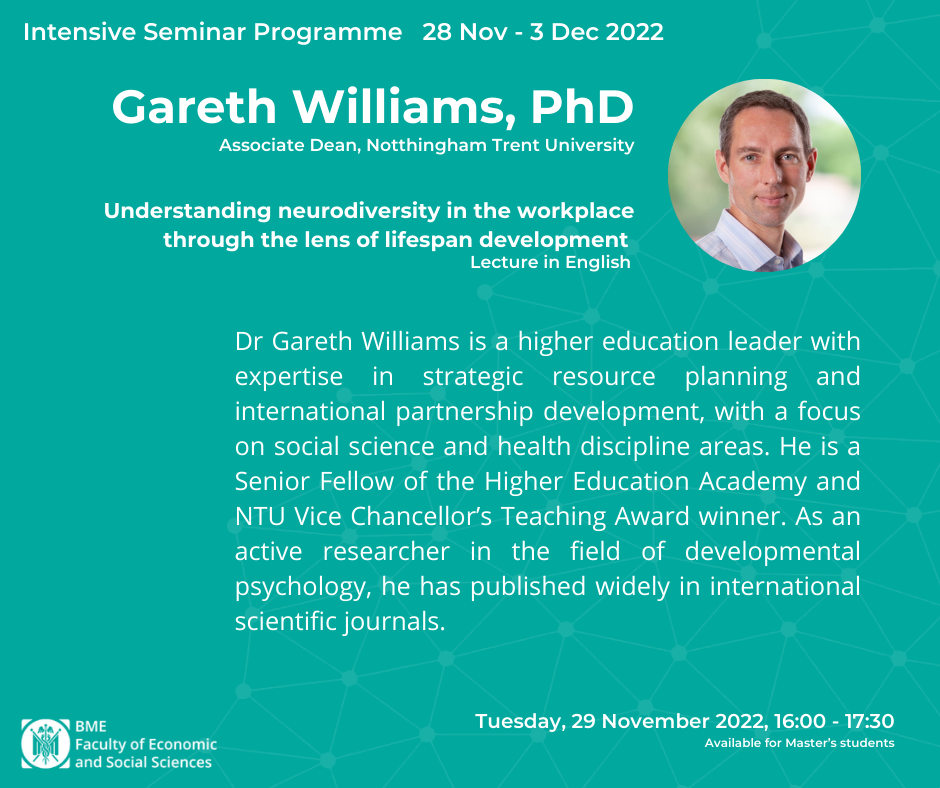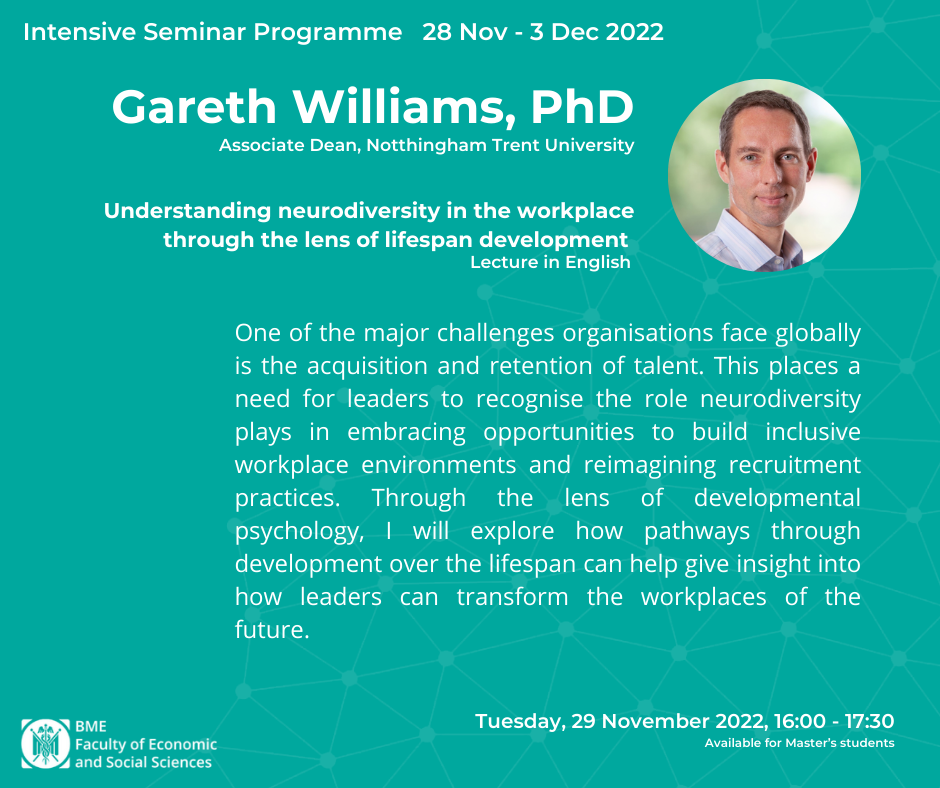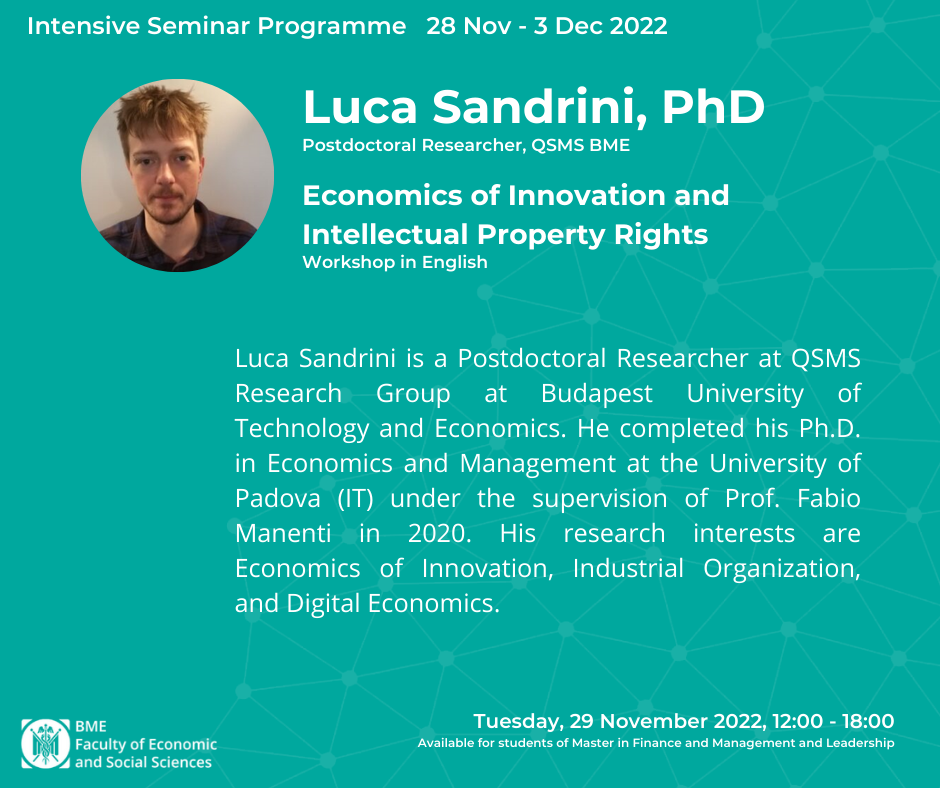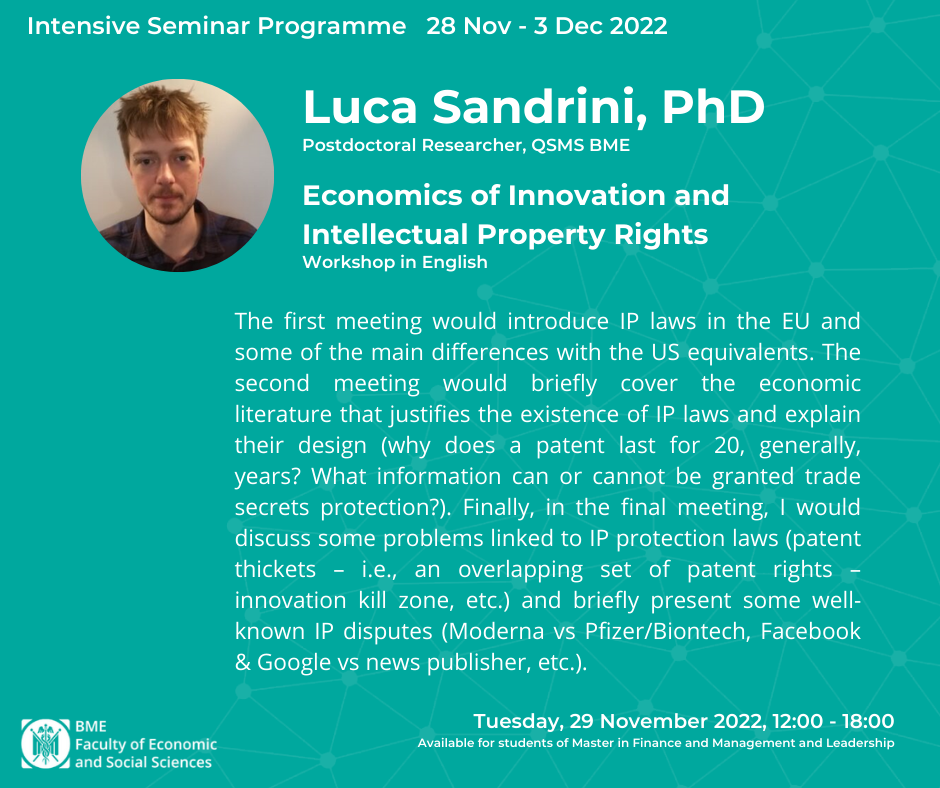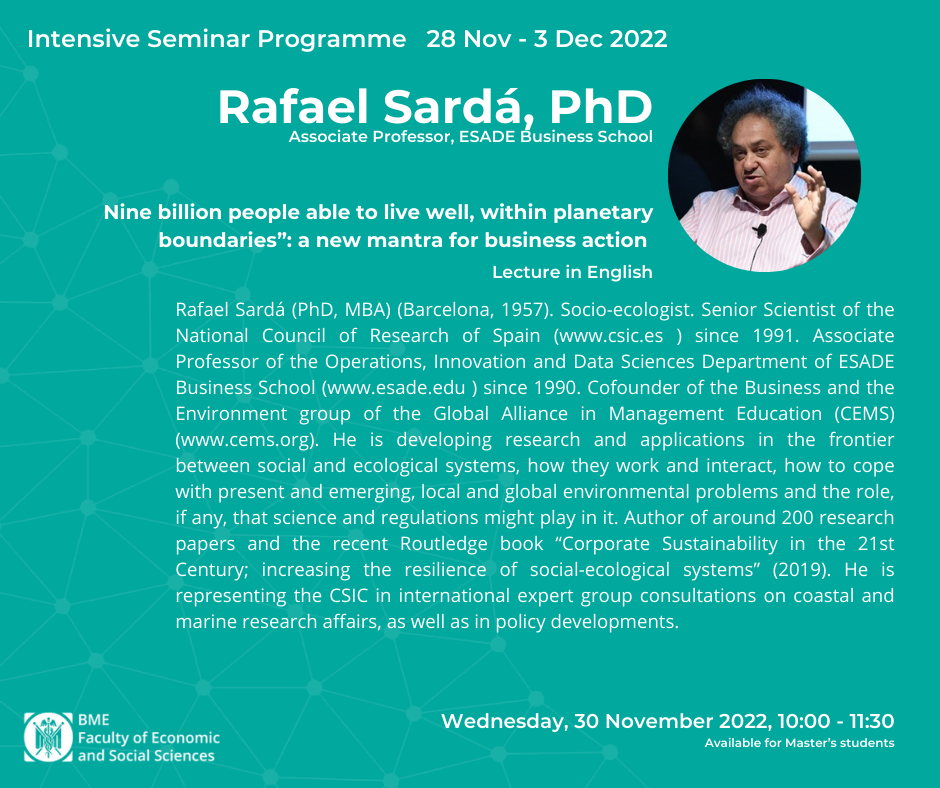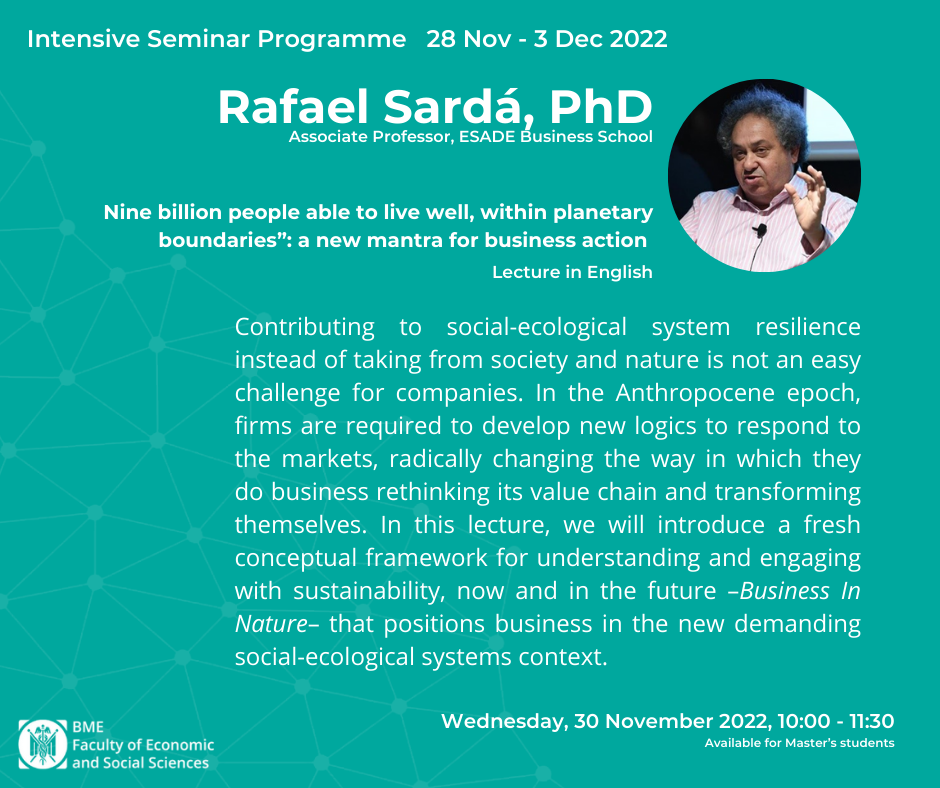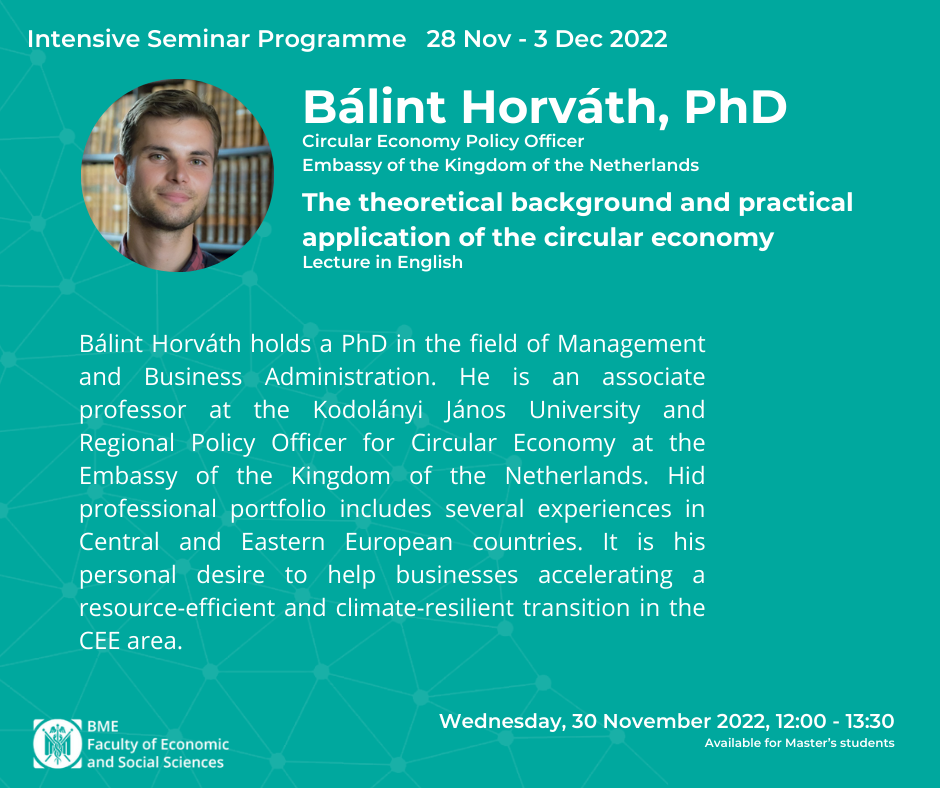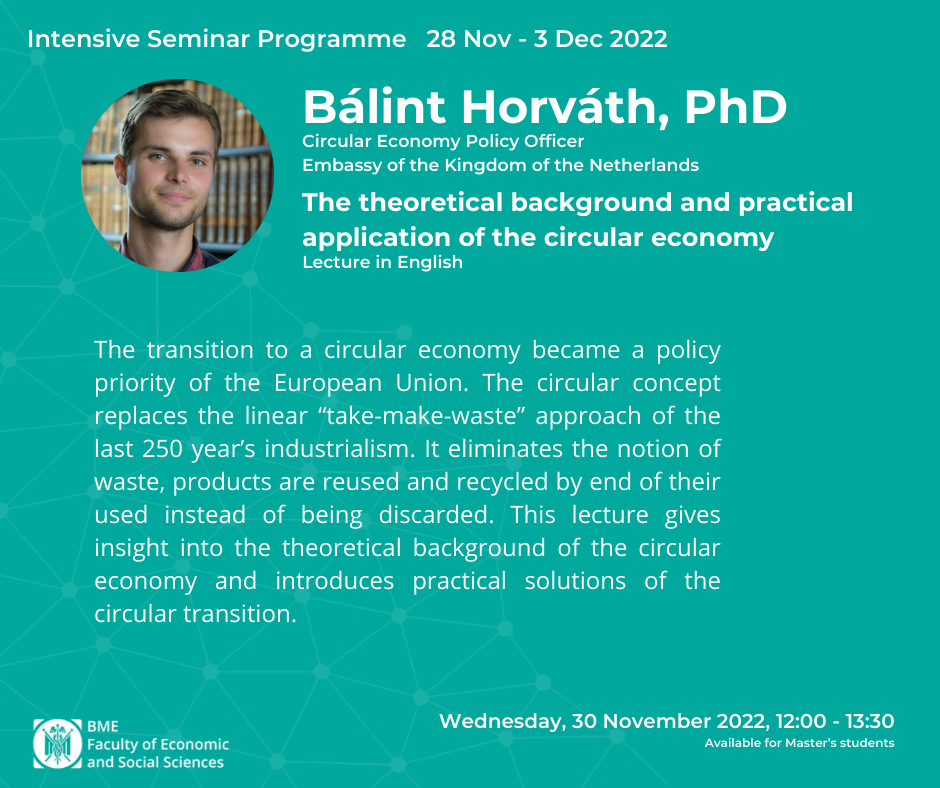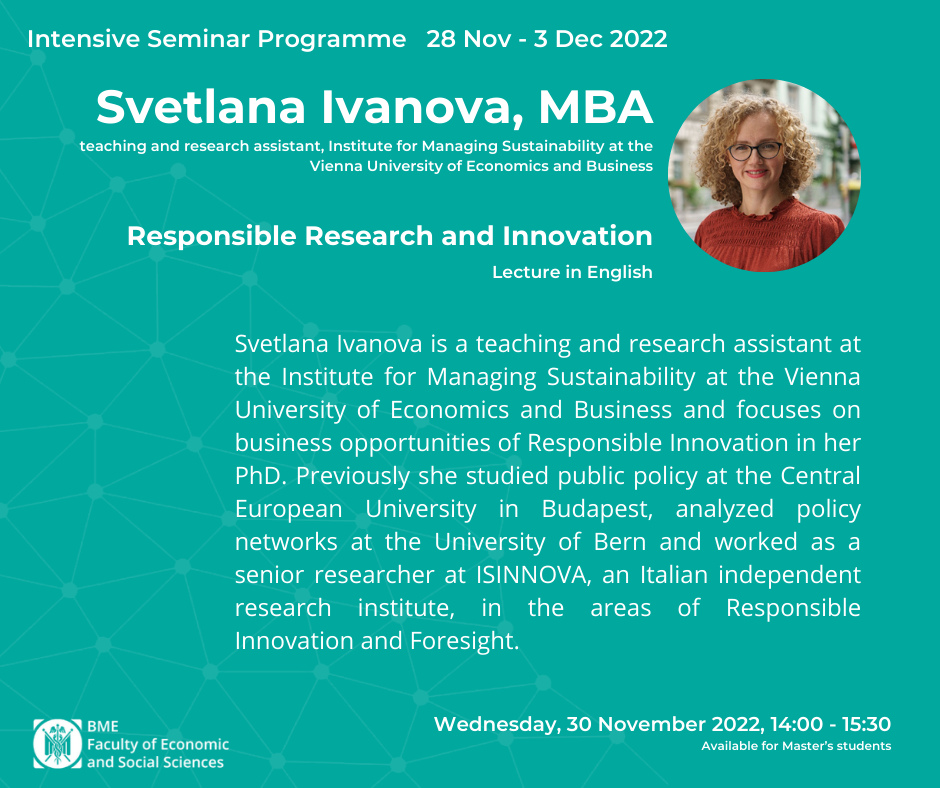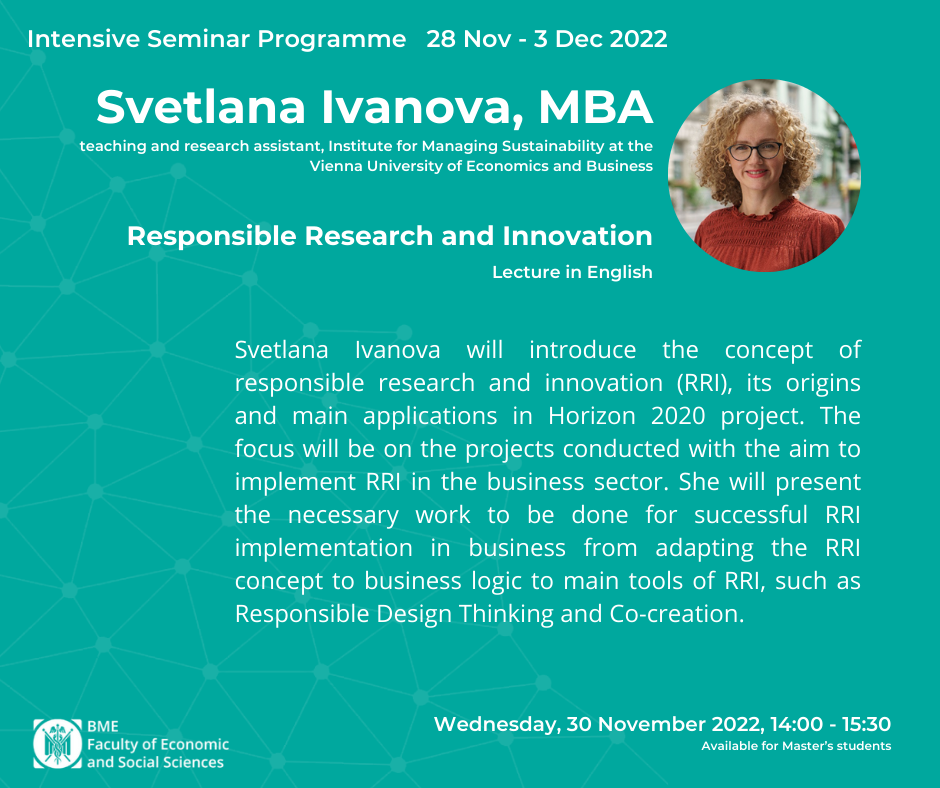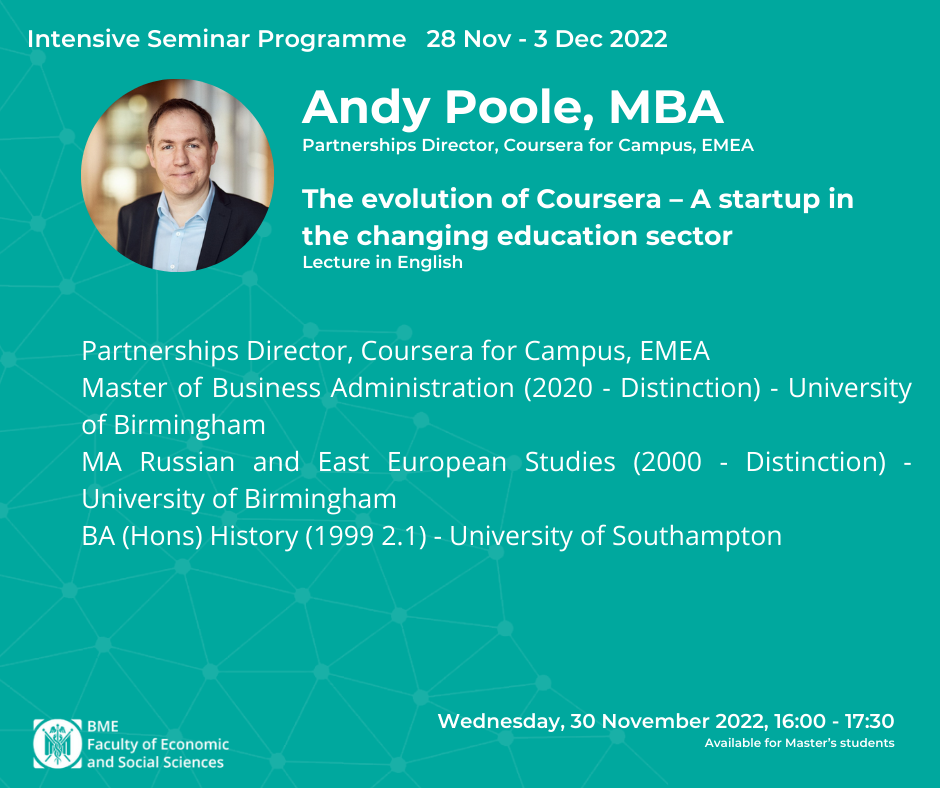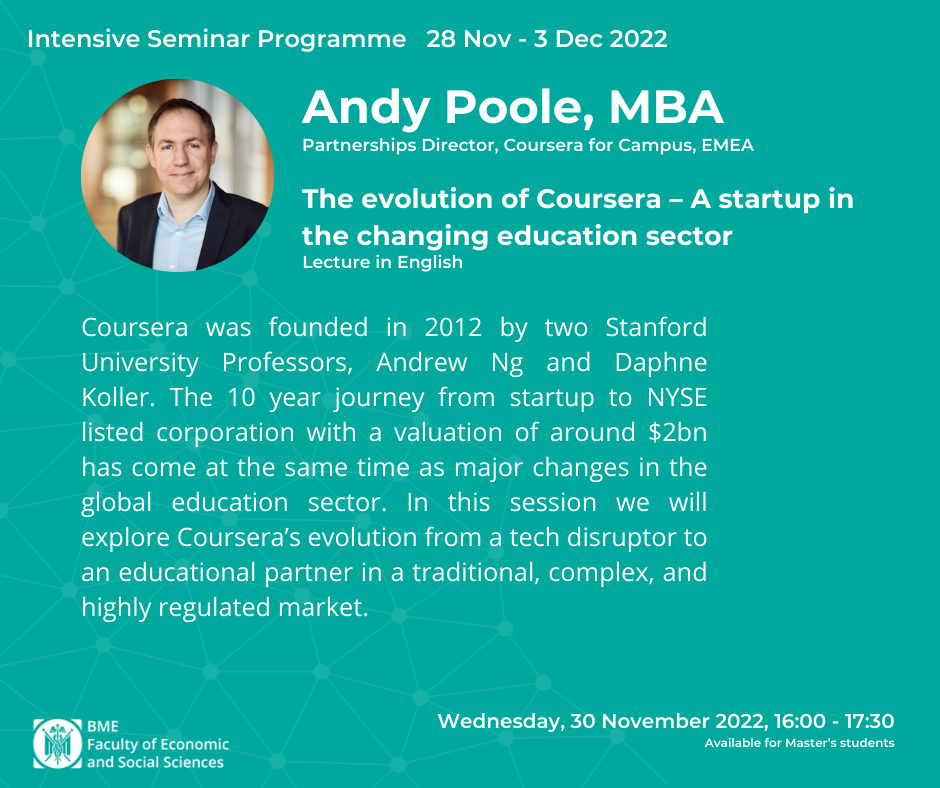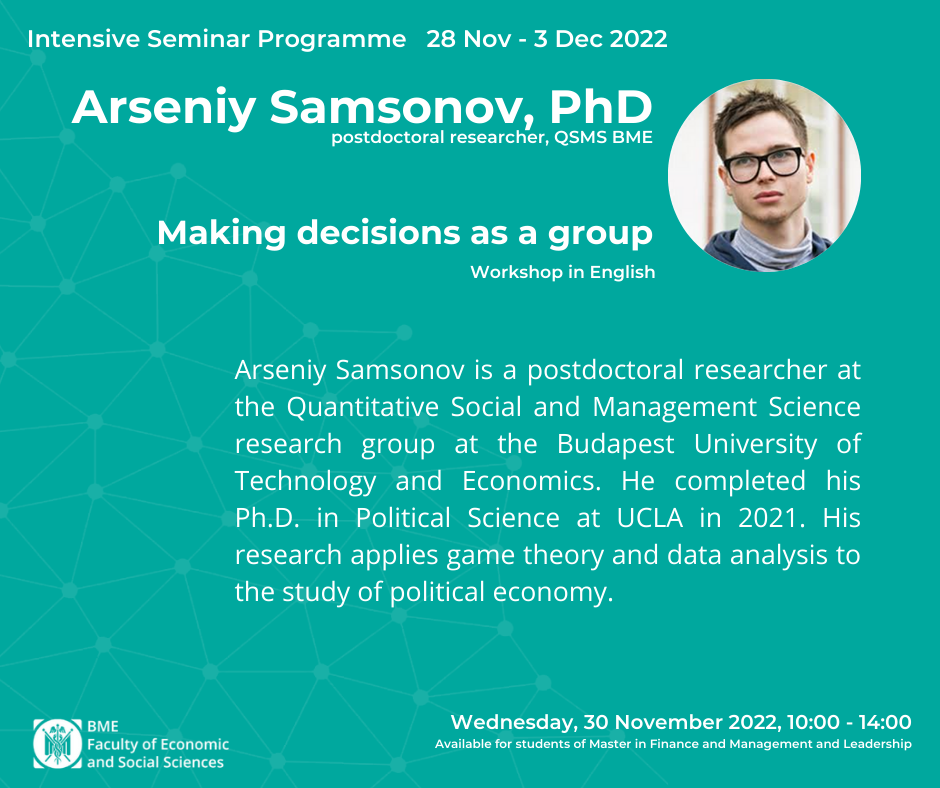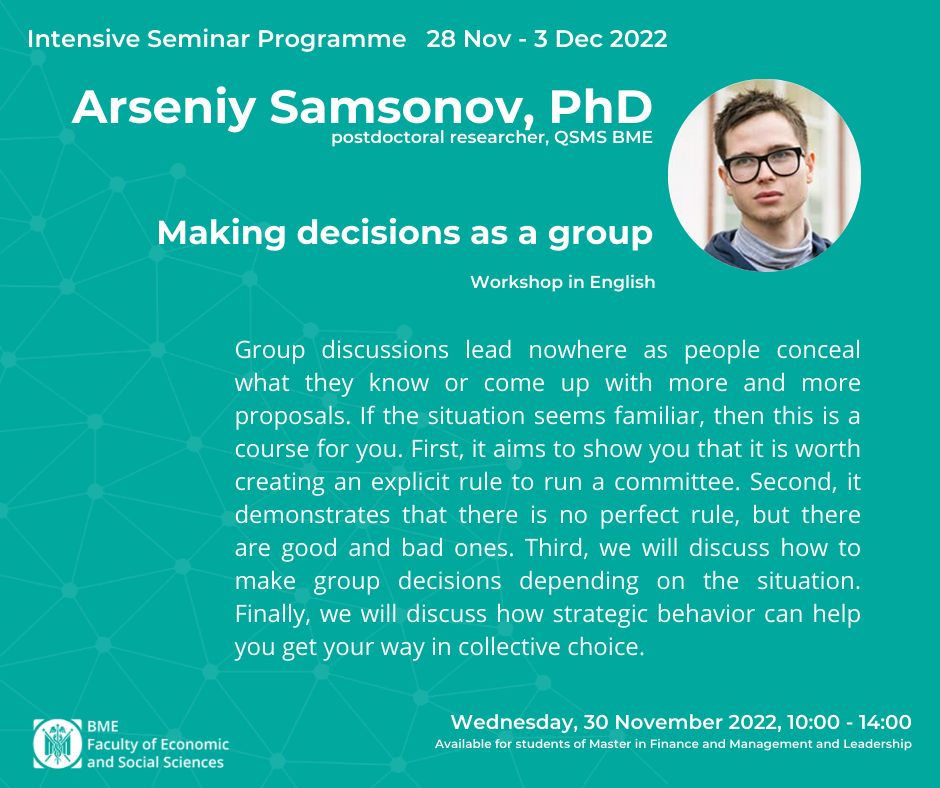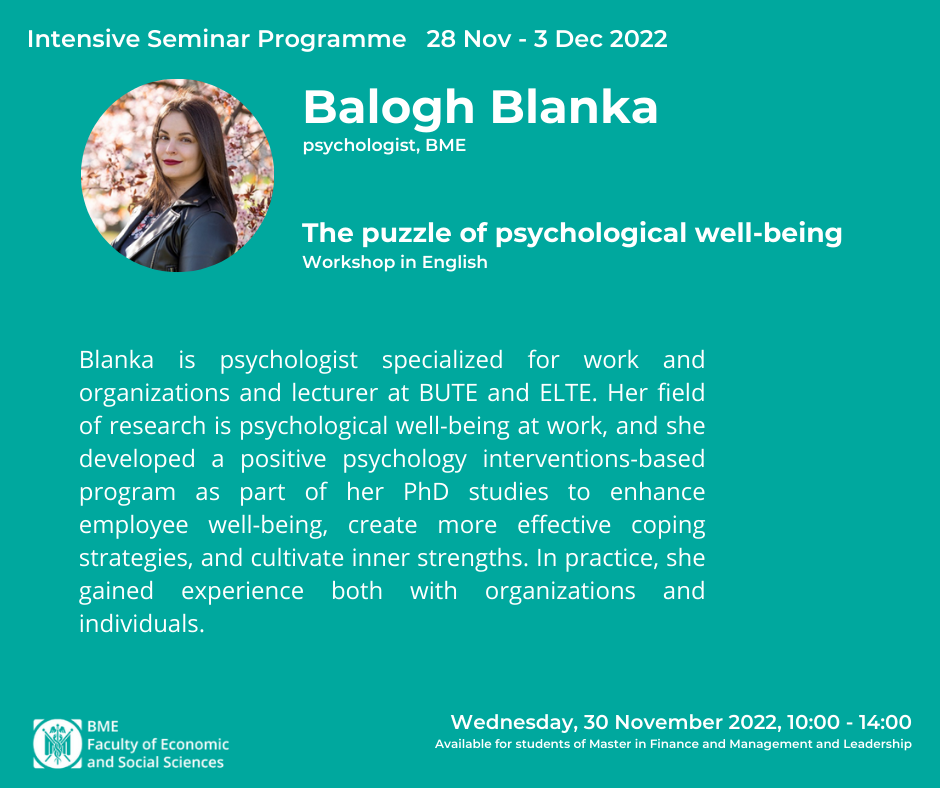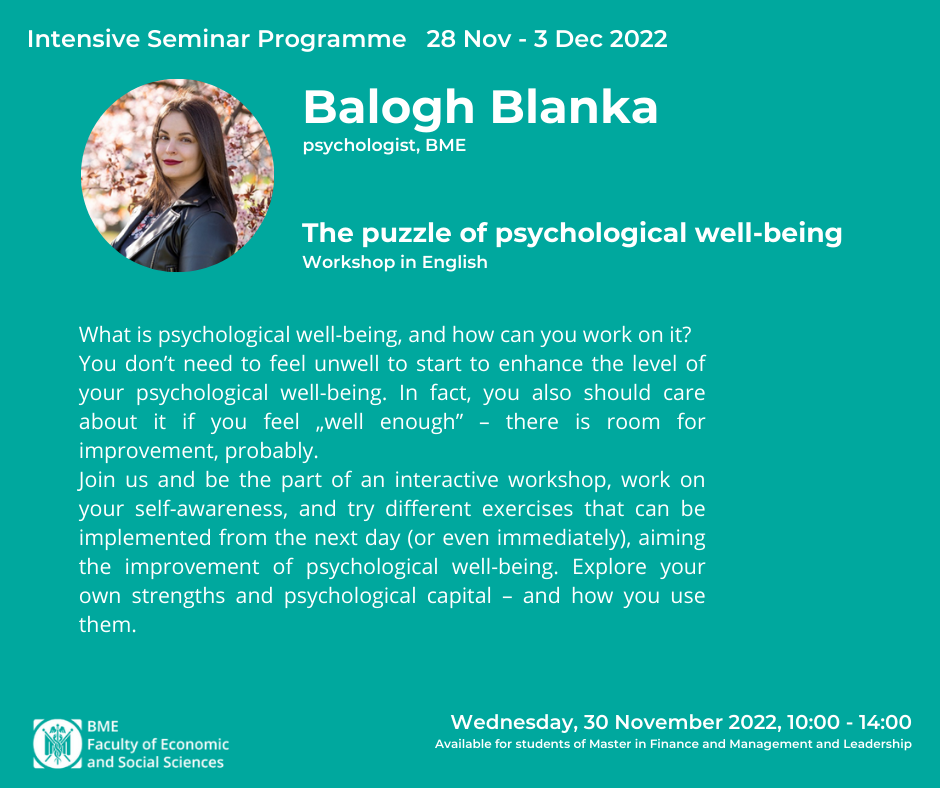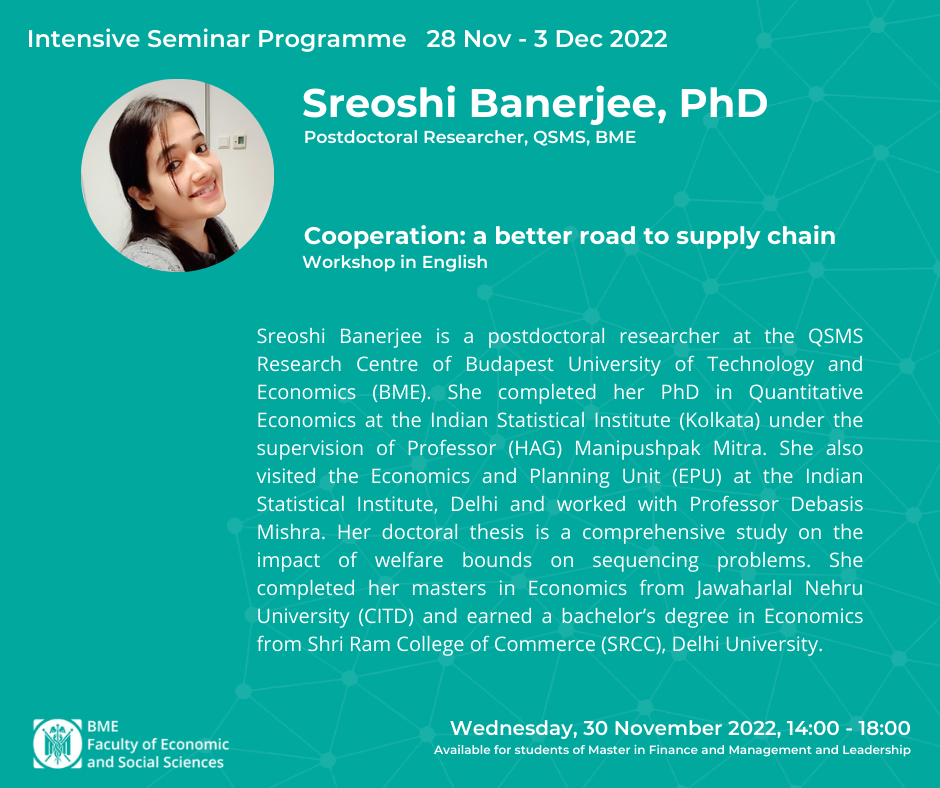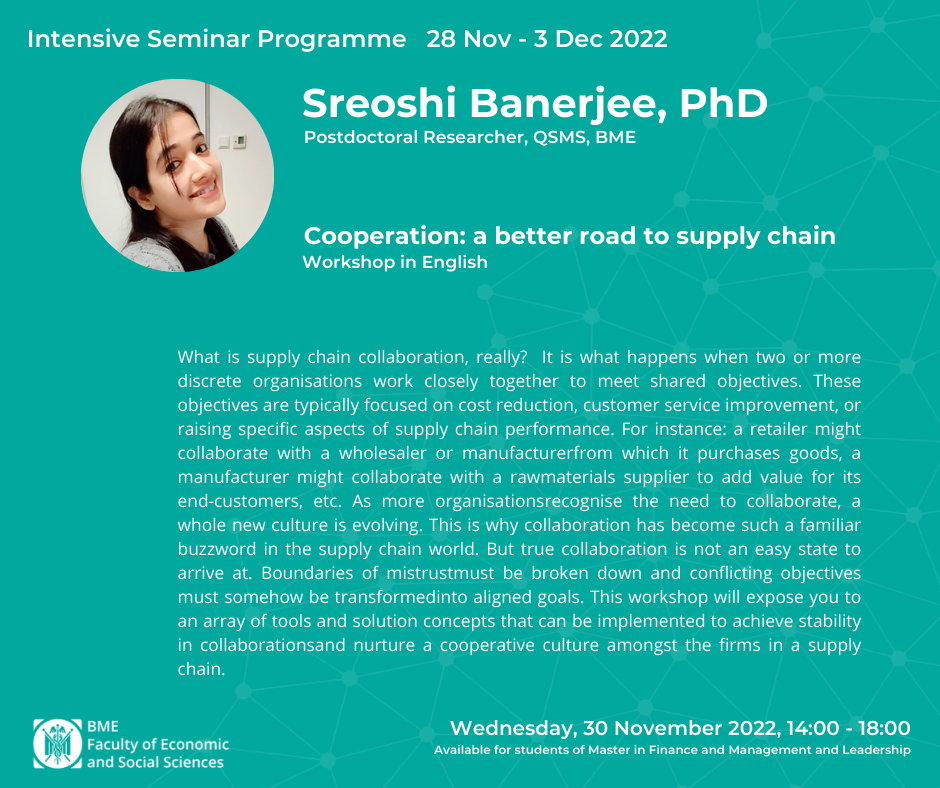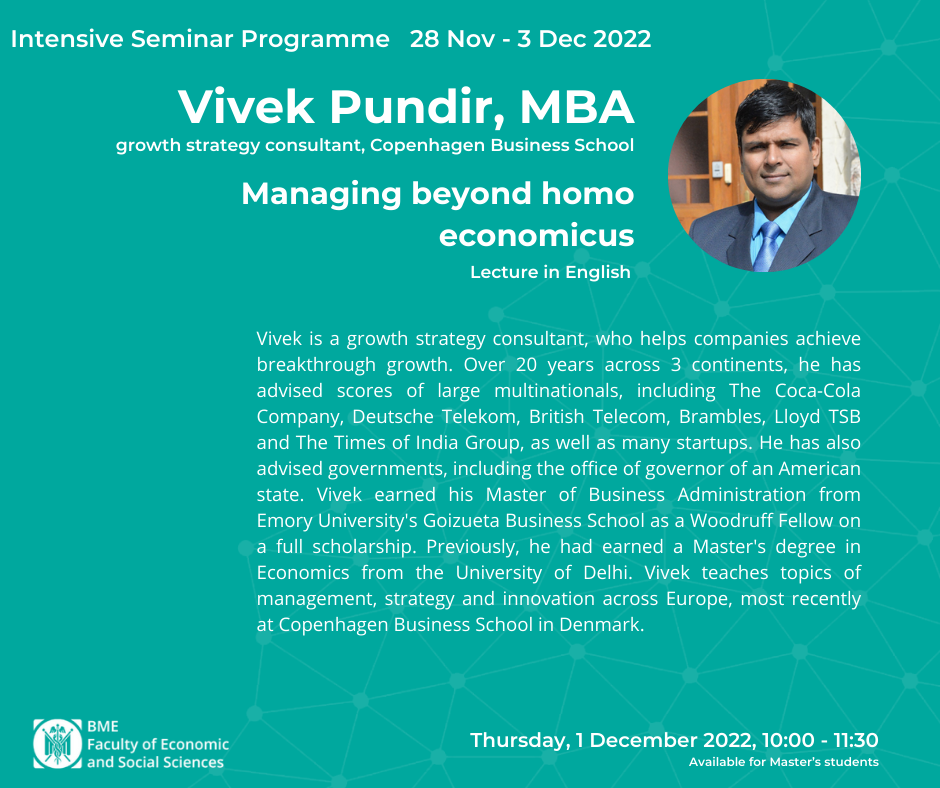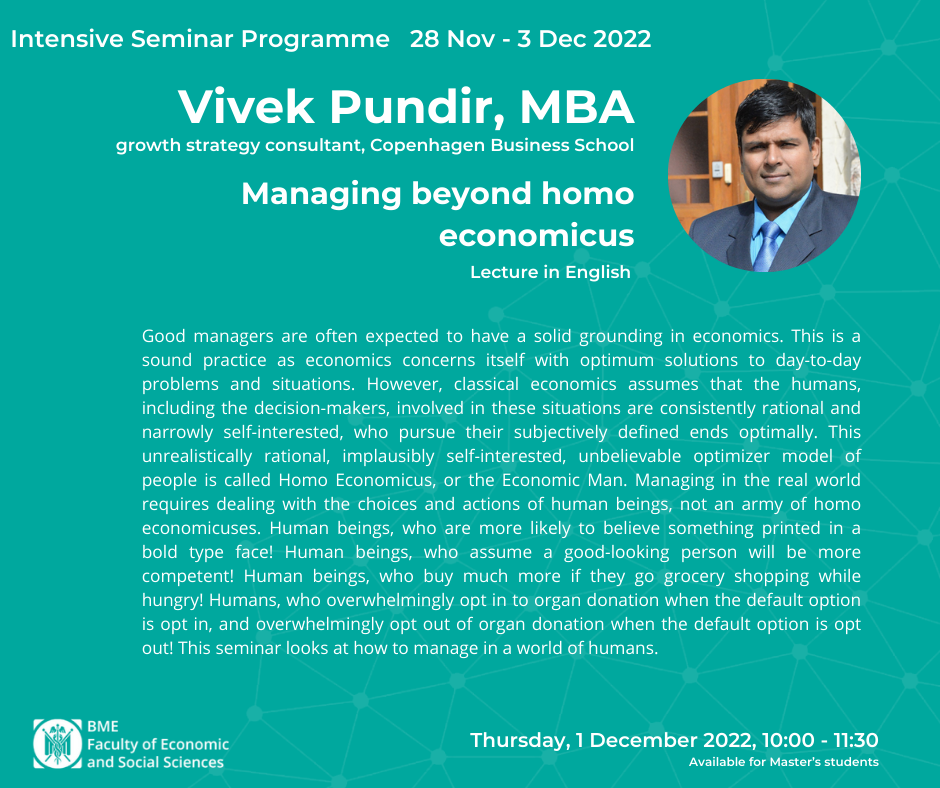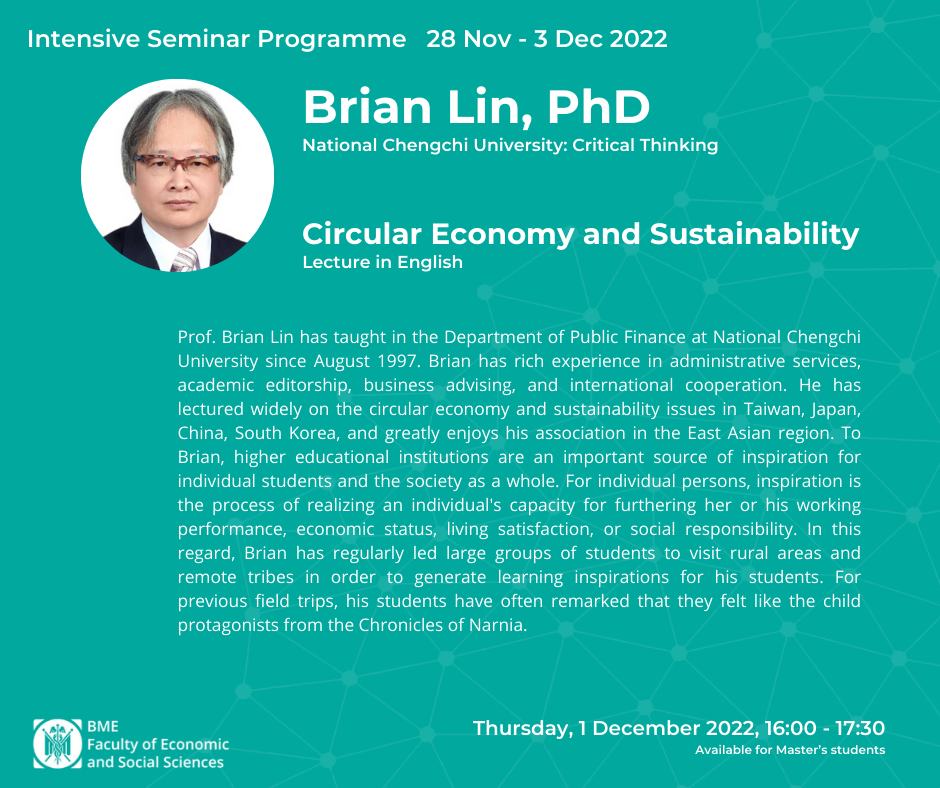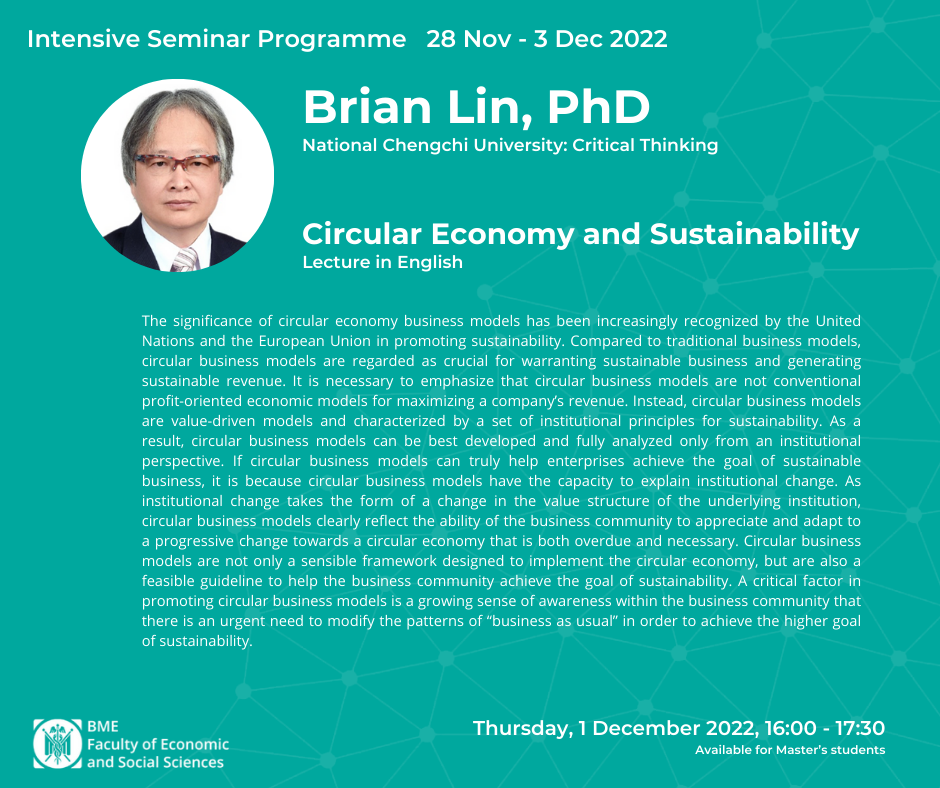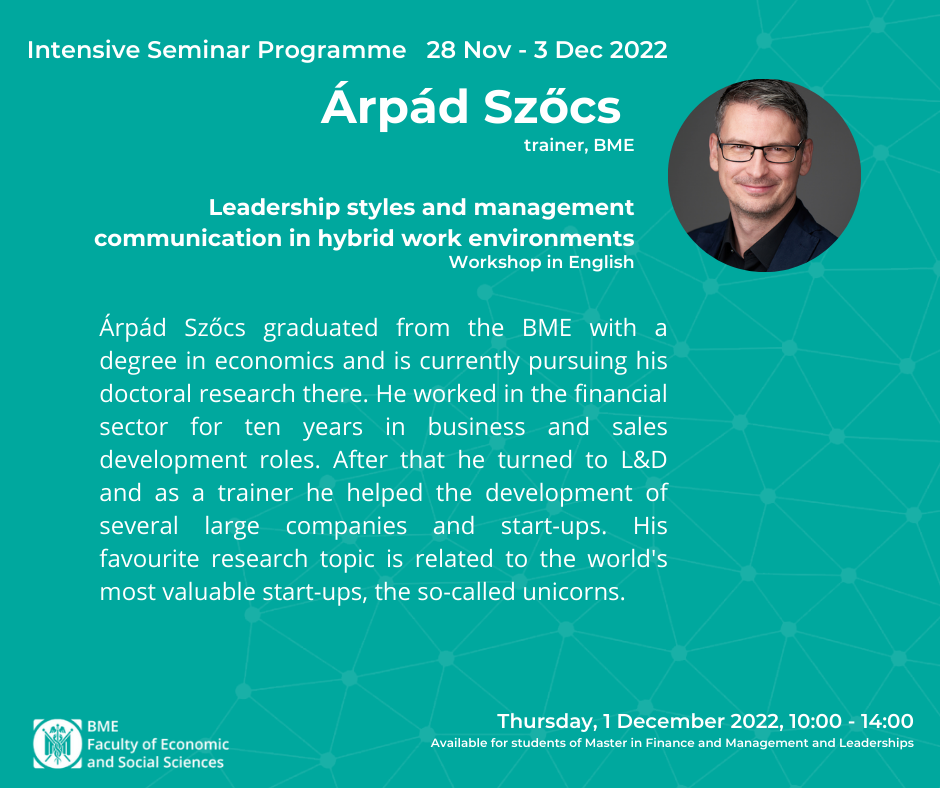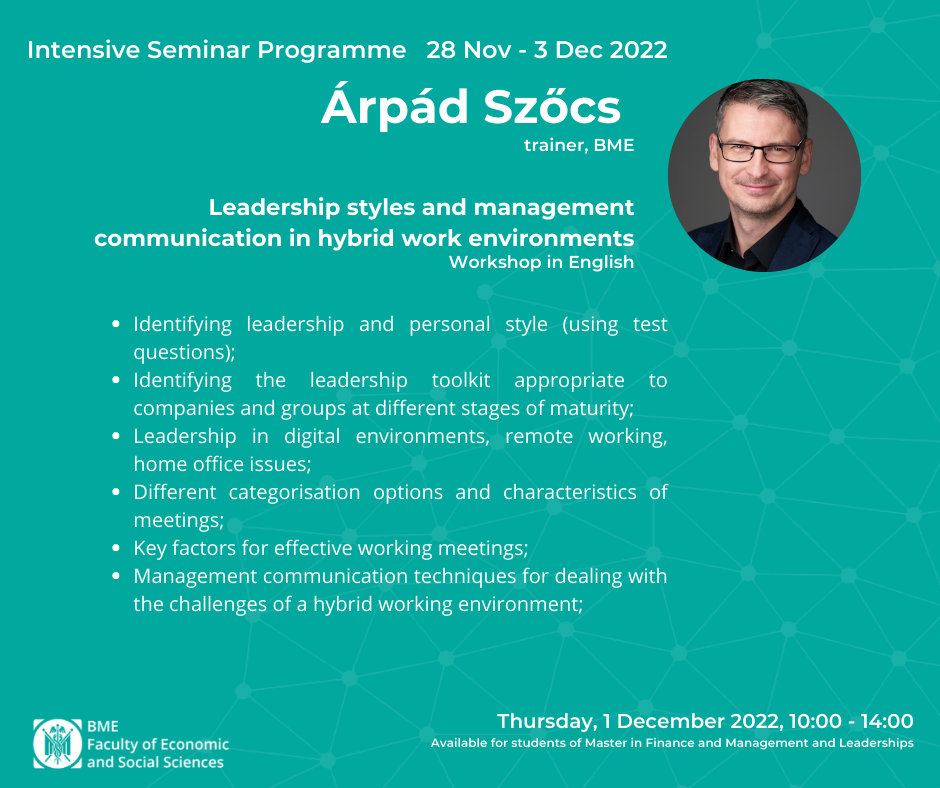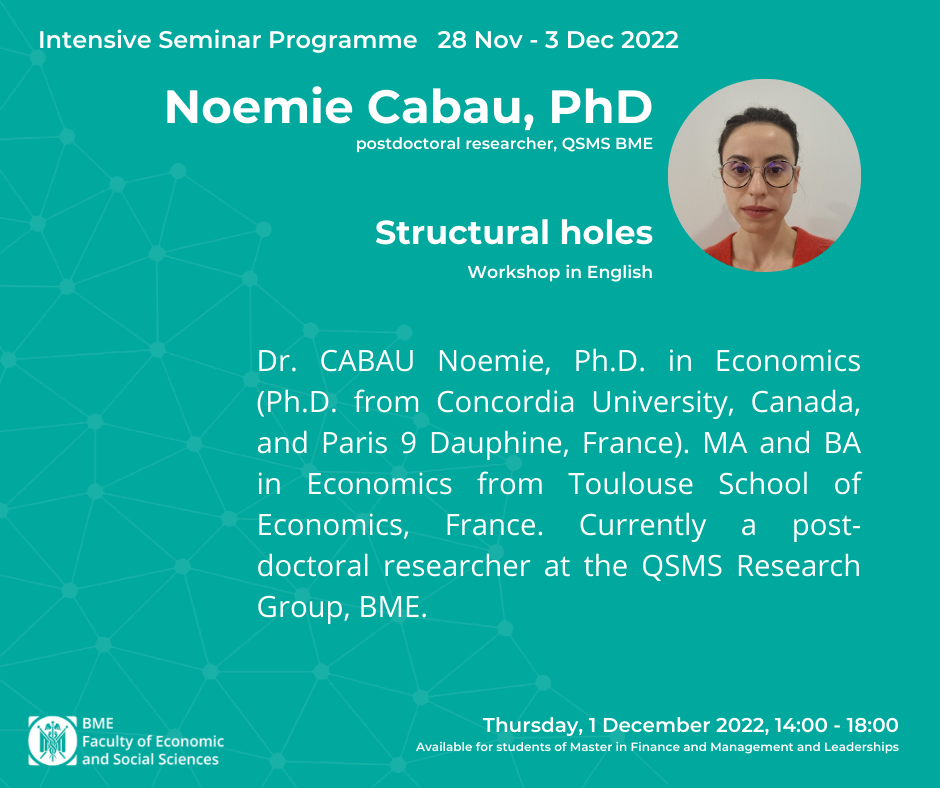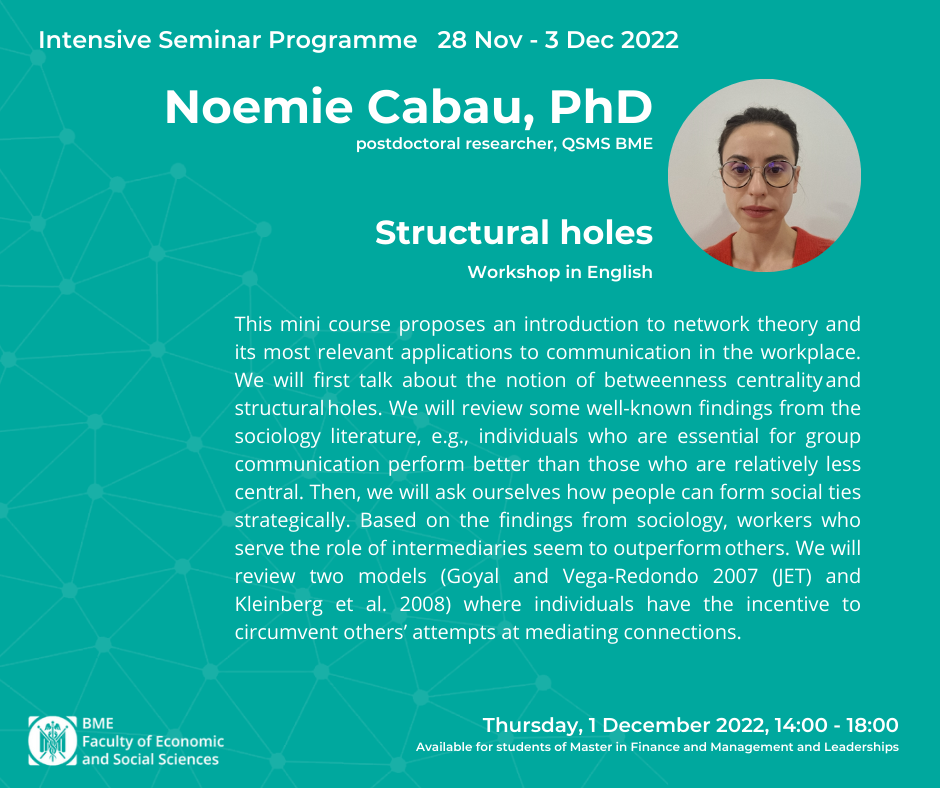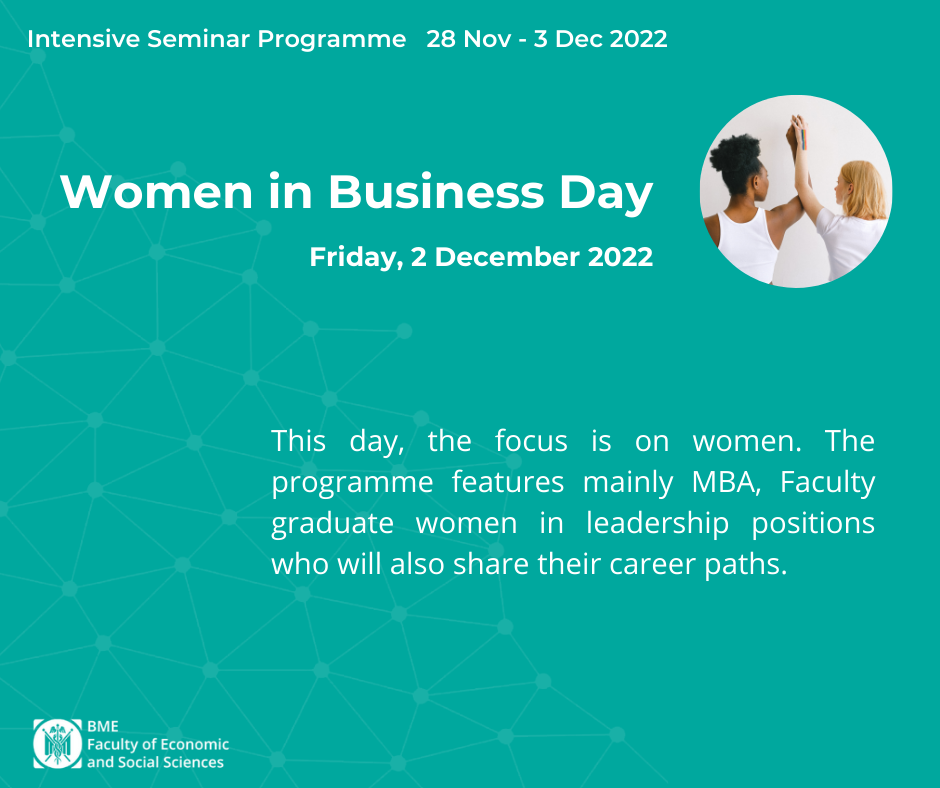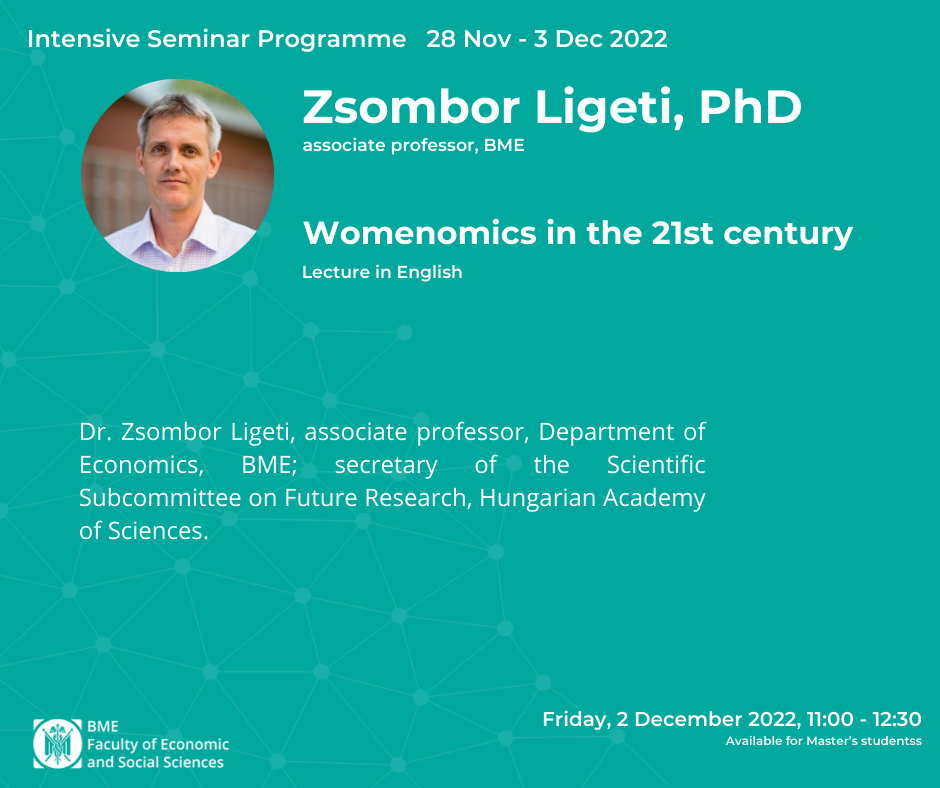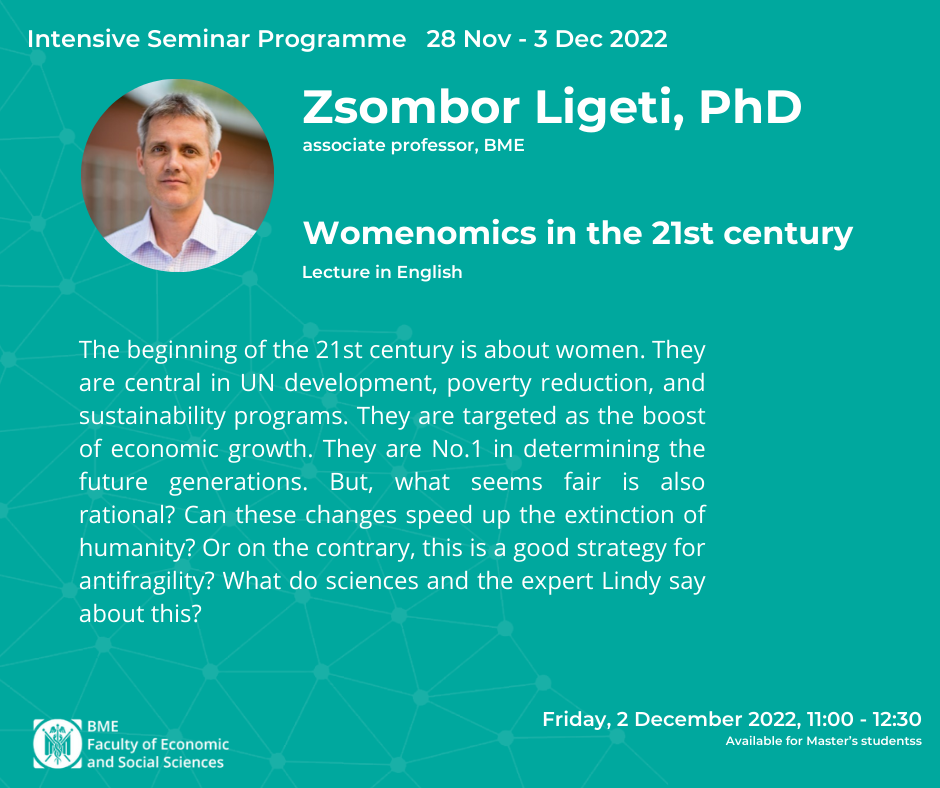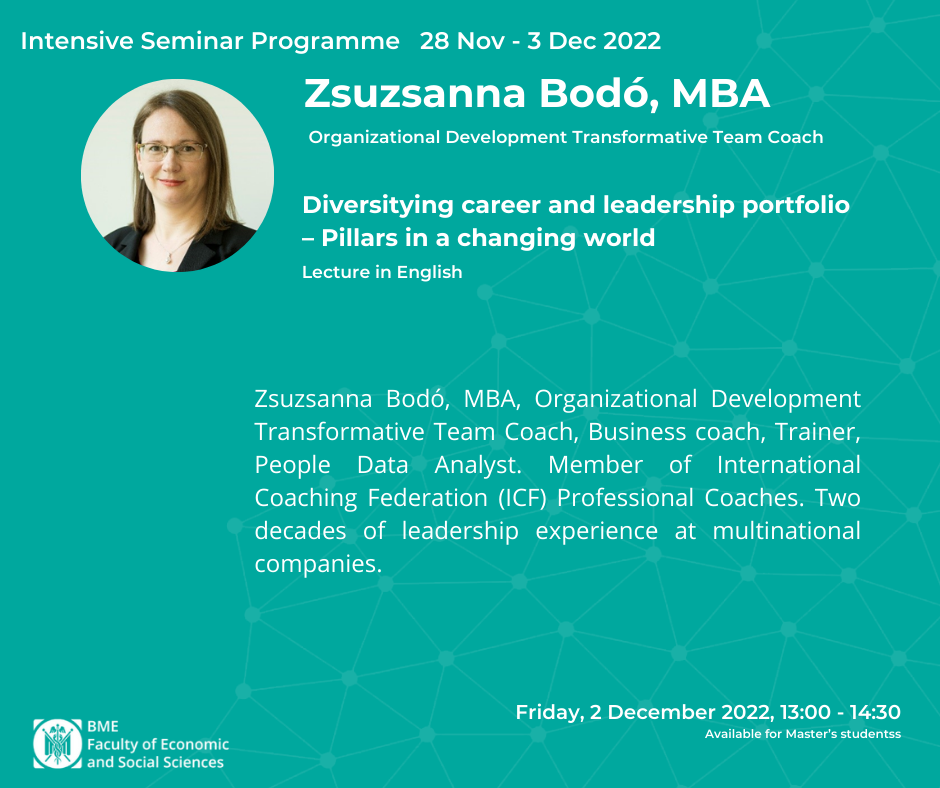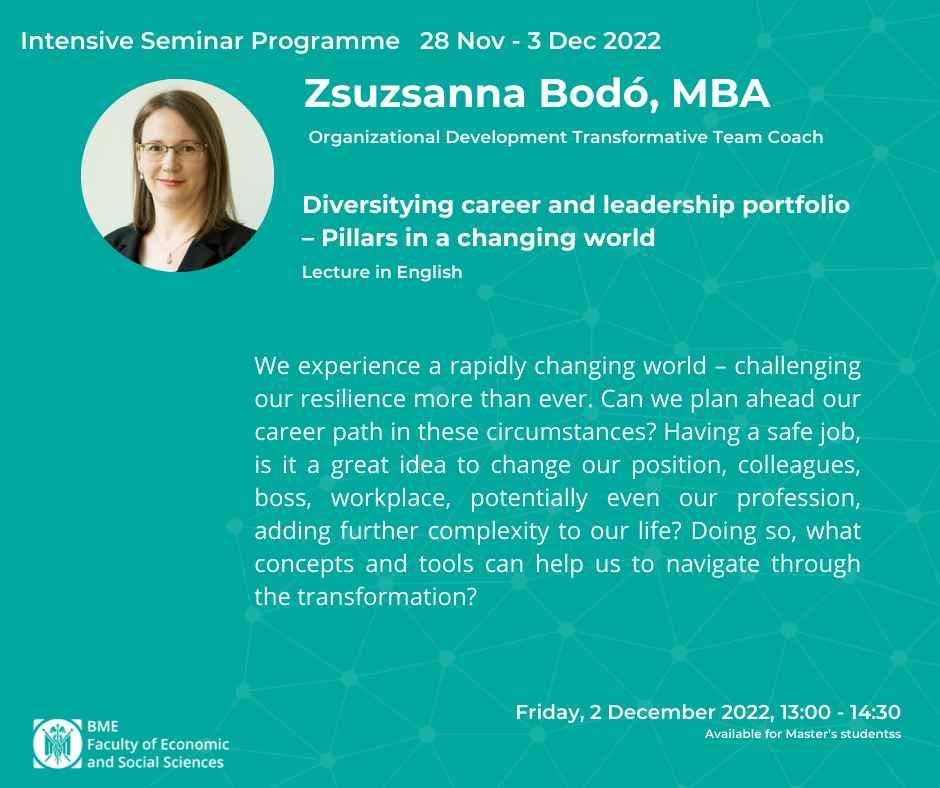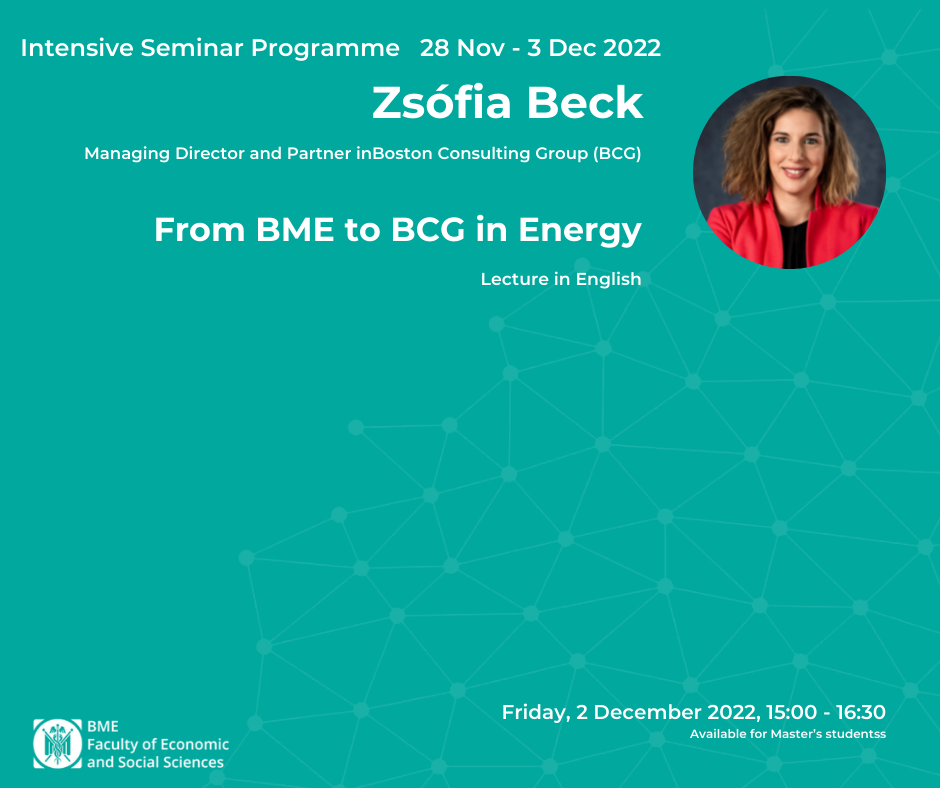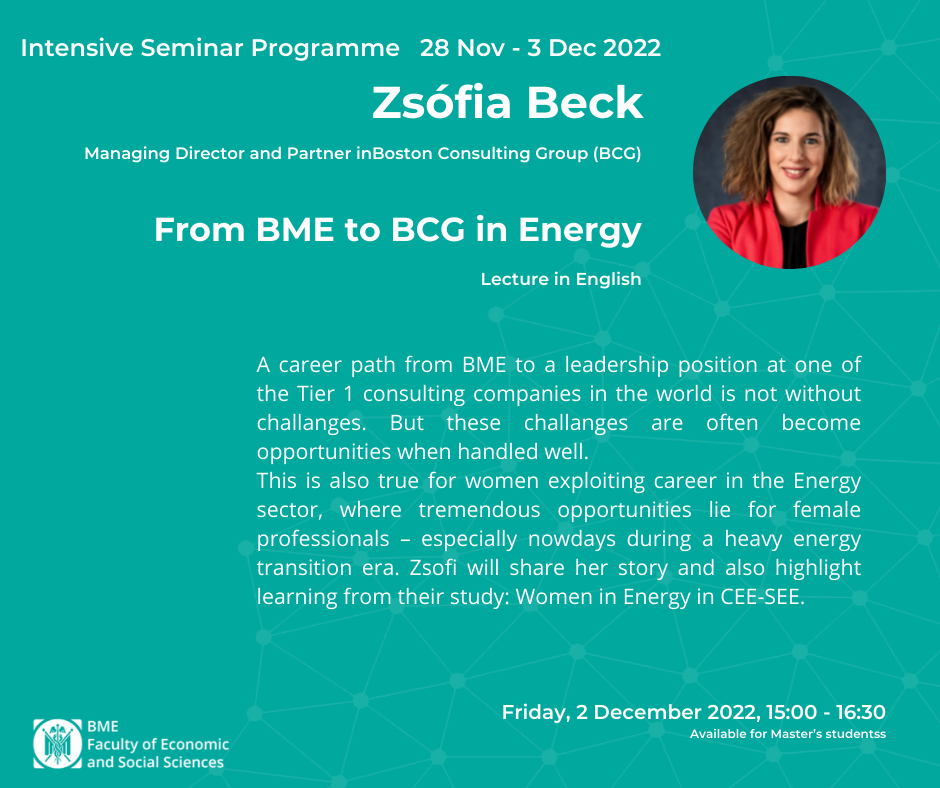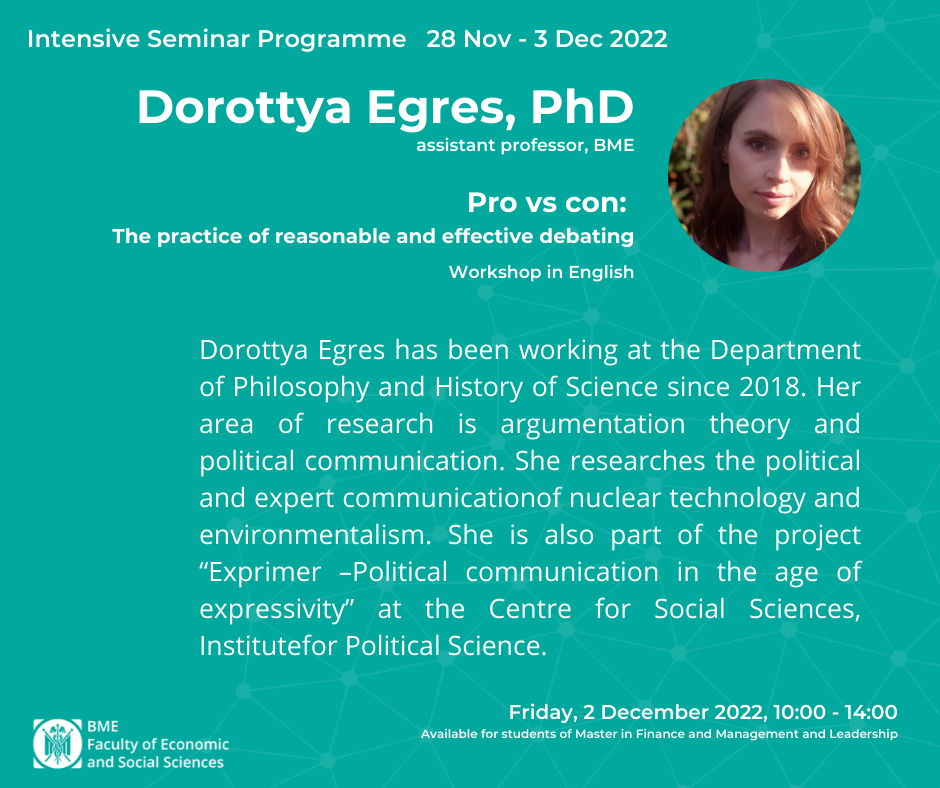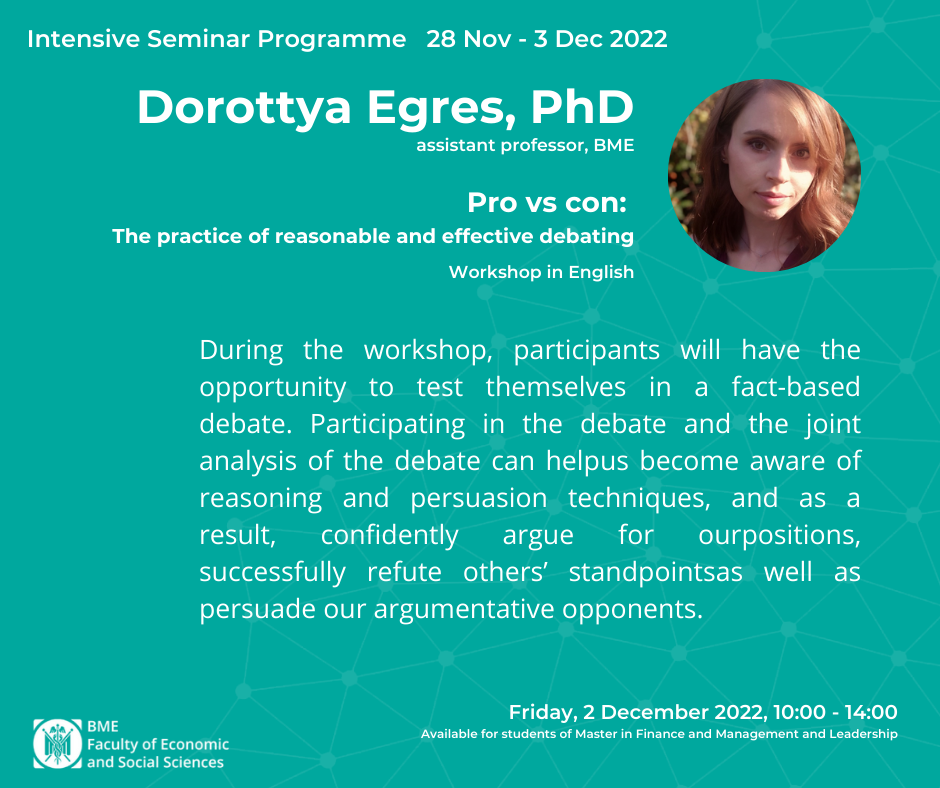Intensive Seminar Programme – 2022
In the academic year of 2022/2023, the Intensive Seminar Programme will take place between 28 November 2022 and 3 December 2022.
The motto of this year’s Intensive Seminar Programme is „Management challenges, communication, and connections in a changing world”. In addition to speakers from foreign higher education institutions and corporate sector, participants will also have the opportunity to meet excellent lecturers from the Faculty of Economics and Social Sciences. This year, there will also be the opportunity to participate in specialised workshops led by the colleagues from our Faculty.
Sustainability is extremely important to our University, and in 2022 the Budapest University of Technology and Economics was awarded the title of the most sustainable university in Hungary. The Intensive Course also focuses on this topic. Choose from our lectures on sustainability!
Programme:
The schedule of lectures is available here.
Monday, 28 November 2022
Lectures – in English
10:00-11:30 Room: QA406
Jacob Brix, PhD – The difficult transitions between exploration and exploitation in established organizations
Available for Master’s students
Professor Jacob Brix will talk about how organizations create balance between exploration and exploitation to remain continuously relevant. In his talk, focus will both be on theoretical ways of thinking about strategic innovation management and on practical issues like ‘how to think and act’ like a strategic innovator.
12:00-13:30 Room: QA406
Lejla Lazovic-Pita, PhD – Tax and non-tax revenues in the EU and selected Western Balkan countries
Available for Master’s students
The purpose of the research is to evaluate and compare tax and non-tax revenues in the EU and selected Western Balkan countries. The comparative analysis includes the main tax types and several non-tax revenues where the impact of GFC and COVID-19 crisis will be highlighted. With a growing climate concerns and most recent EU Green Deal, special attention for a particular group of non-tax revenues that deal with charges for forest protection is discussed.
Workshops in English
10:00 – 14:00 Room: QA323
Arseniy Samsonov, Phd – Writing rules to incentivize people
Available for students of Master in Finance and Management and Leadership
Short introduction: A mini-course on how to write contracts to make employees exert effort at the workplace.
In his Nobel Prize lecture, economist Bengt Holmstrom mentioned that it gets harder for companies to manage their workers, who can now run startups from smartphones while shirking their jobs. Selecting and incentivizing employees is a ubiquitous problem in management. This course analyzes tools such as bonus contracts and tournaments that help bosses to motivate workers and shareholders to control the top managers. We will discuss what makes these approaches work and what the data says about their performance.
Tuesday, 29 November 2022
Lectures – in English
12:00-13:30 Room: QA407
Adela Karapici, PhD – Economic impact of Covid 19 in Albania
Available for Master’s students
For more than two years the world has faced a new enemy called Covid-19 with a huge and tremendous impact on the global economy and on our lives too. It is not only an emergency for public health but has caused an increase in insecurity and mobility which has brought significant changes in the economic structure affecting the real and financial sectors. The coronavirus disease is attacking the societies and economic foundations of countries. Covid 19 has changed our way of thinking, daily habits and has brought a fundamental issue to deal with, which is how we will pass and overcome all the implications and problems that has brought. Global spread of coronavirus has significantly restrained the economy worldwide, causing a dramatic drop in economic growth, FDI flows and investments, consumption, inflation etc. From this perspective, the impact of COVID-19 is analyzed on the global economy and the relevant medium- and long-term challenges, with a particular focus on Albania.
14:00-15:30 Room: QAF14
Miriam Sang-Ah Park, PhD – Psychology of culture in the global age
Available for Master’s students
With globalisation, it becomes increasingly important that we pay attention to the cultures of people, as one’s sociocultural context shapes and influences his/her beliefs, attitudes and behaviours in significant ways. In psychology, we approach culture as a research topic from various angles, starting from examining cultural differences (and similarities), focusing on unique aspects of a particular culture, gathering indigenous knowledge and understanding different ways of life. Different terms might apply thus in describing the field of research within psychology, depending on a researcher’s own perspectives, type of research question and conceptual frameworks- and much of these explorations have implications and relevance for disciplines outside of psychology. It is also possible to focus on the cultural specificities (e.g., why suicide rates are significantly higher in some countries than others?) or to the universals (e.g., are basic human emotions equivalent across cultures?), but equally, either of these approaches can be useful in understanding how the context shapes people and their psyche. In promoting intercultural harmony and reducing racism and stereotypes, such research and its outcome can be especially useful as it can provide us with the deeper understanding of how we differ in our thoughts and behaviours, going beyond just observing differences but providing answers and considerations for why and how these differences exist. In this talk, we will discuss some of these approaches and perspectives, reflect on the role of the culture as the macro social context, go over the main concepts and research findings in cultural and cross-cultural psychology and suggest ways in which we can achieve a more harmonious society.
16:00-17:30 Room: QA404
Gareth Williams, PhD – Understanding neurodiversity in the workplace through the lens of lifespan development
Available for Master’s students
One of the major challenges organisations face globally is the acquisition and retention of talent. This places a need for leaders to recognise the role neurodiversity plays in embracing opportunities to build inclusive workplace environments and reimagining recruitment practices. Through the lens of developmental psychology, I will explore how pathways through development over the lifespan can help give insight into how.
Workshops in English
12:00 – 18:00 Room: QA323
Luca Sandrini, PhD – Economics of Innovation and Intellectual Property Rights
Available for students of Master in Finance and Management and Leadership
The first meeting would introduce IP laws in the EU and some of the main differences with the US equivalents. The second meeting would briefly cover the economic literature that justifies the existence of IP laws and explain their design (why does a patent last for 20, generally, years? What information can or cannot be granted trade secrets protection?). Finally, in the final meeting, I would discuss some problems linked to IP protection laws (patent thickets – i.e., an overlapping set of patent rights – innovation kill zone, etc.) and briefly present some well-known IP disputes (Moderna vs Pfizer/Biontech, Facebook & Google vs news publisher, etc.).
Wednesday, 30 November 2022
Lectures – in English
10:00-11:30 Room: QB402
Rafael Sardá, PhD – “Nine billion people able to live well, within planetary boundaries”: a new mantra for business action
Available for Master’s students
Contributing to social-ecological system resilience instead of taking from society and nature is not an easy challenge for companies. In the Anthropocene epoch, firms are required to develop new logics to respond to the markets, radically changing the way in which they do business rethinking its value chain and transforming themselves. In this lecture, we will introduce a fresh conceptual framework for understanding and engaging with sustainability, now and in the future –Business In Nature- that positions business in the new demanding social-ecological systems context.
12:00-13:30 Room: QA406
Bálint Horváth, PhD – The theoretical background and practical application of the circular economy
Available for Master’s students
The transition to a circular economy became a policy priority of the European Union. The circular concept replaces the linear “take-make-waste” approach of the last 250 year’s industrialism. It eliminates the notion of waste, products are reused and recycled by end of their used instead of being discarded. This lecture gives insight into the theoretical background of the circular economy and introduces practical solutions of the circular transition.
14:00-15:30 Room: QB404
Svetlana Ivanova – Responsible Research and Innovation
Available for Master’s students
Svetlana Ivanova will introduce the concept of responsible research and innovation (RRI), its origins and main applications in Horizon 2020 project. The focus will be on the projects conducted with the aim to implement RRI in the business sector. She will present the necessary work to be done for successful RRI implementation in business from adapting the RRI concept to business logic to main tools of RRI, such as Responsible Design Thinking and Co-creation.
16:00-17:30 Room: QB404
Andy Poole – The evolution of Coursera – A startup in the changing education sector
Available for Master’s students
Coursera was founded in 2012 by two Stanford University Professors, Andrew Ng and Daphne Koller. The 10 year journey from startup to NYSE listed corporation with a valuation of around $2bn has come at the same time as major changes in the global education sector. In this session we will explore Coursera’s evolution from a tech disruptor to an educational partner in a traditional, complex, and highly regulated market.
Workshops in English
10:00 – 14:00 Room: QA323
Arseniy Samsonov, PhD – Making decisions as a group
Available for students of Master in Finance and Management and Leadership
Short introduction: A mini-course on challenges of group decision-making and ways to overcome them.
Group discussions lead nowhere as people conceal what they know or come up with more and more proposals. If the situation seems familiar, then this is a course for you. First, it aims to show you that it is worth creating an explicit rule to run a committee. Second, it demonstrates that there is no perfect rule, but there are good and bad ones. Third, we will discuss how to make group decisions depending on the situation. Finally, we will discuss how strategic behavior can help you get your way in collective choice.
10:00 – 14:00 Room: QA403
Blanka Balogh – The puzzle of psychological well-being
Available for students of Master in Finance and Management and Leadership
What is psychological well-being, and how can you work on it?
You don’t need to feel unwell to start to enhance the level of your psychological well-being. In fact, you also should care about it if you feel „well enough” – there is room for improvement, probably.
Join us and be the part of an interactive workshop, work on your self-awareness, and try different exercises that can be implemented from the next day (or even immediately), aiming the improvement of psychological well-being. Explore your own strengths and psychological capital – and how you use them.
14:00 – 18:00 Room: QA406
Sreoshi Banerjee, Phd – Cooperation: a better road to supply chain
Available for students of Master in Finance and Management and Leadership
What is supply chain collaboration, really? It is what happenswhen two or more discrete organisations work closely together to meet sharedobjectives. These objectives are typically focused on cost reduction, customerservice improvement, or raising specific aspects of supply chain performance.For instance: a retailer might collaborate with a wholesaler or manufacturerfrom which it purchases goods, a manufacturer might collaborate with a rawmaterials supplier to add value for its end-customers, etc. As more organisationsrecognise the need to collaborate, a whole new culture is evolving. This is whycollaboration has become such a familiar buzzword in the supply chain world.But true collaboration is not an easy state to arrive at. Boundaries of mistrustmust be broken down and conflicting objectives must somehow be transformedinto aligned goals. This workshop will expose you to an array of tools and so-lution concepts that can be implemented to achieve stability in collaborationsand nurture a cooperative culture amongst the firms in a supply chain.
Thursday, 1 December 2022
Lectures – in English
10:00-11:30 Room: QA407
Vivek Pundir – Managing beyond homo economicus
Available for Master’s students
Good managers are often expected to have a solid grounding in economics. This is a sound practice as economics concerns itself with optimum solutions to day-to-day problems and situations. However, classical economics assumes that the humans, including the decision-makers, involved in these situations are consistently rational and narrowly self-interested, who pursue their subjectively defined ends optimally. This unrealistically rational, implausibly self-interested, unbelievable optimizer model of people is called Homo Economicus, or the Economic Man. Managing in the real world requires dealing with the choices and actions of human beings, not an army of homo economic uses. Human beings who are more likely to believe something printed in a bold typeface! Human beings, who assume a good-looking person will be more competent! Human beings, who buy much more if they go grocery shopping while hungry! Humans, who overwhelmingly opt in to organ donation when the default option is opt in, and overwhelmingly opt out of organ donation when the default option is opt out! This seminar looks at how to manage in a world of humans.
16:00-17:30 Room: QB404
Brian Lin, PhD – Critical Thinking – Circular Economy and Sustainability
Available for Master’s students
The significance of circular economy business models has been increasingly recognized by the United Nations and the European Union in promoting sustainability. Compared to traditional business models, circular business models are regarded as crucial for warranting sustainable business and generating sustainable revenue. It is necessary to emphasize that circular business models are not conventional profit-oriented economic models for maximizing a company’s revenue. Instead, circular business models are value-driven models and characterized by a set of institutional principles for sustainability. As a result, circular business models can be best developed and fully analyzed only from an institutional perspective. If circular business models can truly help enterprises achieve the goal of sustainable business, it is because circular business models have the capacity to explain institutional change. As institutional change takes the form of a change in the value structure of the underlying institution, circular business models clearly reflect the ability of the business community to appreciate and adapt to a progressive change towards a circular economy that is both overdue and necessary. Circular business models are not only a sensible framework designed to implement the circular economy, but are also a feasible guideline to help the business community achieve the goal of sustainability. A critical factor in promoting circular business models is a growing sense of awareness within the business community that there is an urgent need to modify the patterns of “business as usual” in order to achieve the higher goal of sustainability.
Workshops in English
10:00 – 14:00 Room: QA406
Árpád Szőcs – Leadership styles and management communication in hybrid work environments
Available for students of Master in Finance and Management and Leadership
Identifying leadership and personal style (using test questions); Identifying the leadership toolkit appropriate to companies and groups at different stages of maturity; Leadership in digital environments, remote working, home office issues; Different categorisation options and characteristics of meetings; Key factors for effective working meetings; Management communication techniques for dealing with the challenges of a hybrid working environment;
14:00 – 18:00 Room: QA407
Noemie Cabau, PhD – Structural holes
Available for students of Master in Finance and Management and Leadership
This mini course proposes an introduction to network theory and its most relevant applications to communication in the workplace. We will first talk about the notion of betweenness centrality and structural holes. We will review some well-known findings from the sociology literature, e.g., individuals who are essential for group communication perform better than those who are relatively less central. Then, we will ask ourselves how people can form social ties strategically. Based on the findings from sociology, workers who serve the role of intermediaries seem to outperform others. We will review two models (Goyal and Vega-Redondo 2007 (JET) and Kleinberg et al. 2008) where individuals have the incentive to circumvent others’ attempts at mediating connections.
Friday, 2 December 2022
Women in Business Day
This day, the focus is on women. The programme features mainly MBA, Faculty graduate women in leadership positions who will also share their career paths.
Lectures – in English
11:00-12:30 Room: QB404
Zsombor Ligeti, PhD – Womenomics in the 21st century
Available for Master’s students
The beginning of the 21st century is about women. They are central in UN development, poverty reduction, and sustainability programs. They are targeted as the boost of economic growth. They are No.1 in determining the future generations. But, what seems fair is also rational? Can these changes speed up the extinction of humanity? Or on the contrary, this is a good strategy for antifragility? What do sciences and the expert Lindy say about this?
13:00-14:30 Room: QB404
Zsuzsanna Bodó – Diversifying career and leadership portfolio – Pillars in a changing world
Available for Master’s students
We experience a rapidly changing world – challenging our resilience more than ever. Can we plan ahead our career path in these circumstances? Having a safe job, is it a great idea to change our position, colleagues, boss, workplace, potentially even our profession, adding further complexity to our life? Doing so, what concepts and tools can help us to navigate through the transformation?
15:00-16:30 Room: QB404
Zsófia Beck – From BME to BCG in Energy
Available for Master’s students
A career path from BME to a leadership position at one of the Tier 1 consulting companies in the world is not without challanges. But these challanges are often become opportunities when handled well. This is also true for women exploiting career in the Energy sector, where tremendous opportunities lie for female professionals – especially nowdays during a heavy energy transition era. Zsofi will share her story and also highlight learning from their study: Women in Energy in CEE-SEE.
Workshops in English
10:00-14:00 Room: QA226
Dorottya Egres, PhD – Pro vs con: The practice of reasonable and effective debating
Available for students of Master in Finance and Management and Leadership
During the workshop, participants will have the opportunity to test themselves in a fact-based debate. Participating in the debate and the joint analysis of the debate can helpus become aware of reasoning and persuasion techniques, and as a result, confidently argue for ourpositions, successfully refute others’ standpoints as well as persuade our argumentative opponents.
Saturday, 3 December 2022
Networking Event
QB 4th floor
The intensive seminar is going to end on Saturday with an opportunity for participants to connect in a more informal setting. We welcome all colleagues, speakers and students to our networking event, where playful exercises will help you to get to know each other, and then you can continue talking in a pleasant atmosphere, looking for common ground and building (professional) relationships.
Registration is required for participation in the Networking Event. Please register by 12pm 1 December via the following form“.
See you there – let’s connect!
For the sessions in Hungarian, please follow the below link: Intenzív kurzus – BME GTK
